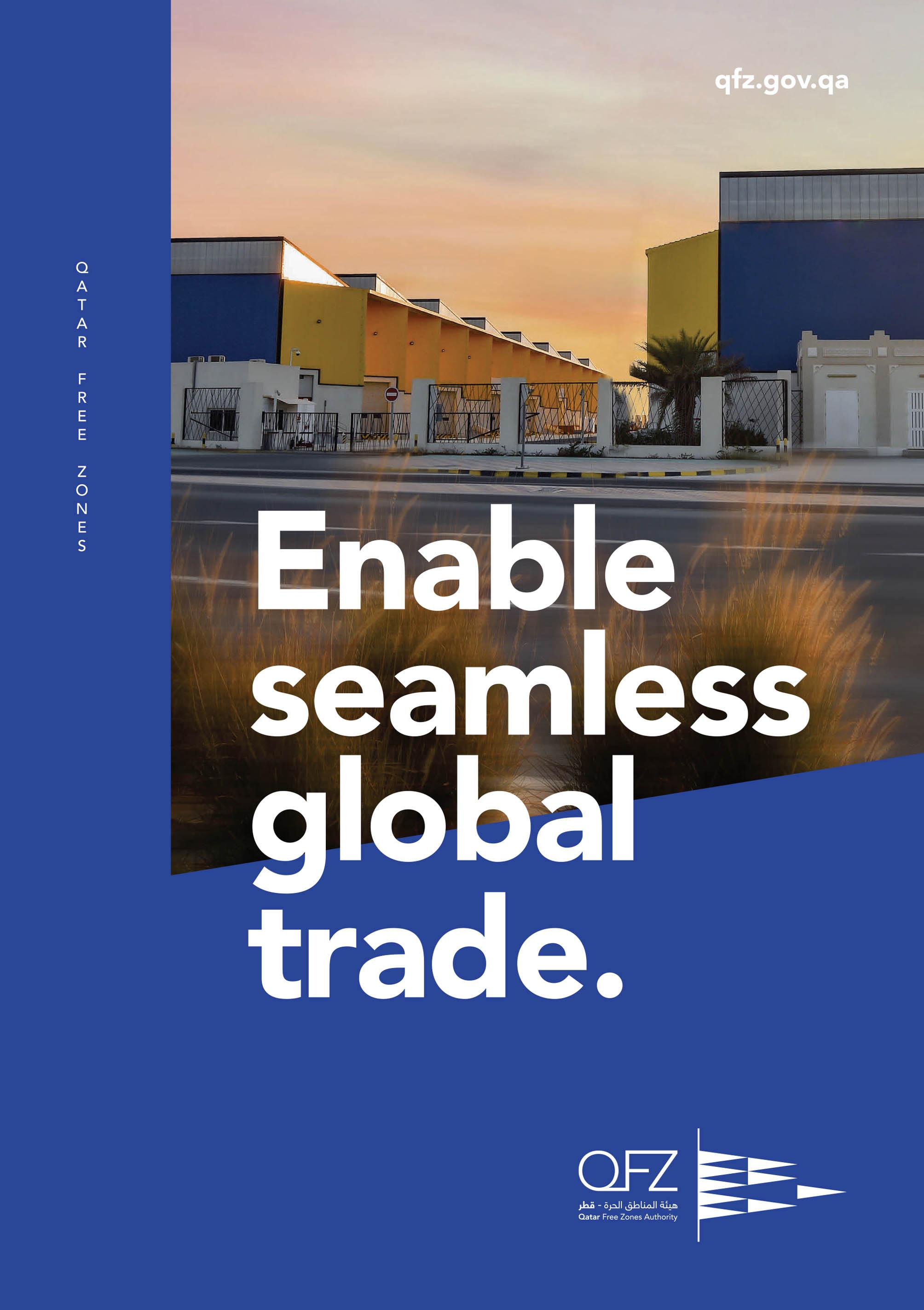
Business & Economy in Qatar WINTER 2022/23 85 ISSUE BANKING AND FINANCE ECONOMY AND COMMERCE USEFUL NUMBERS INVESTMENT AND TRADE THE HYDROCARBON INDUSTRY INFRASTRUCTURE IN QATAR FEATURES: NEW PROCEDURES TO SUPPORT BUSINESSES IN QATAR DATA PRIVACY PROTECTION LAW GUIDELINES ISSUED QETAIFAN ISLAND NORTH

QATAR BUSINESS AND ECONOMY E-GUIDE © MARHABA

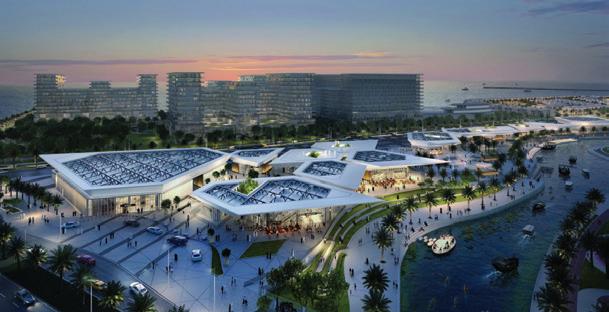
Business and Economy Business and Economy • Useful Numbers: Banks and Exchange Houses • The Banking Network in Qatar • Currency • The Banking Sector • Qatar Central Bank • Qatar Credit Bureau • Loans, Bank Charges and Interest Rates • Accounts • Financial Services and Insurance • Islamic Finance Banking and Finance • Economic Growth and Gross Domestic Product (GDP) • Trade Surplus • The Budget • Inflation and Cost of Living • Population and the Labour Force Economy • Incentives • Investment Regulations • Choosing a Business Structure • Company Structures • Commercial Registration • Export and Import • Taxation • Intellectual Property • Regulatory Bodies and Government‑owned Entities • Qatar Financial Centre • Qatar Exchange • Real Estate • Developers and Real Estate Agents Selling Property • Business Etiquette Investment and Trade Commerce Useful Numbers Feature – New Procedures to Support Businesses in Qatar Doing business in Qatar continues to get easier, with new initiatives launched to ease processes. © MARHABA M85 WINTER 2022/23 The information contained in this guide has been checked and verified as correct as at the time of compilation. Due to the COVID 19 pandemic, information is subject to change. Follow marhaba.qa for the latest updates. An overview of local infrastructure, ongoing megaprojects and new developments. Infrastructure in Qatar Feature – Qetaifan Island North Read the latest about Lusail City’s stunning new island project, with apartments designed by Elie Saab and the 85 metre Icon Tower! The Hydrocarbon Industry • Qatar’s Energy Companies • International Companies marhaba.qa PRINT and ONLINE
Hilary Bainbridge
Editorial
Marhaba endeavours to quote accurate information and updates each of its sections every issue. However, the company accepts no responsibility or liability for any false, inaccurate, inappropriate or incomplete information presented, whether in print, on the website, or on social media channels.
© 2022 Marhaba Information Guide. All Rights Reserved. No part of this magazine may be reproduced, in any form, without written permission of the publishers.

Dana Public Relations PO Box 3797, Doha, Qatar
Tel (+974) 4465 5533, 4465 0083
General Information marhaba@marhaba.com.qa
Follow us
Founder & Managing Editor
Sarah Palmer (Editor) Ola Diab (Deputy Editor) Terry Sutcliffe Advertising
Retail
Howard Bainbridge Charlotte Wright Maria Anicas
Sales Ayen Molina Online/Digital Lalaine Turqueza Weslee Dizon Design and Artwork Dick Tamayo Mar Principe








© MARHABA WINTER 2022/23
A 1 B C D E 2 3 Salwa Rd Bridge 55 55 55 56 56 38 52 52 37 36 53 53 53 53 54 54 54 35 34 70 70 70 70 30 31 67 33 32 51 51 51 51 68 68 5 2 1 6 4 3 Al Waab City Medical QNA GAC Traffic Dept HQ Hyatt Plaza KidsZania Villaggio Qatar Veterinary Centre Royal Vet Jassim Bin Hamad Stadium (Al Sadd Club) Garvey’s Al Rayyan Security Dept Racing& Equestrian Club Al Rayyan Traffic Police Awqaf Zakat Fund Al Maamoura Traffic Police Jarir Bookstore Food Centres Ansar Gallery Wathnan Mall Royal Hall Al Rayyan Municipality Academy Aspetar Aspire Park Al Aziziyah Boutique Hotel LuLu Al Gharrafa Sports Club Qatar Veterinary Centre Park View Pet Centre Dahl Al Hamam Family Park Doha Shooting Club Qatar Guest Centre FAHES Abdullah Bin Khalifa Stadium (Al Duhail Sports Club) Doha Festival City Duhail Water Pumping Station IKEA Qatar Environment and Energy Research Institute (QEERI) QSTP Car Park Gate 2 AmiriGuard Celebration Hall Mall of Qatar Al Wajba QNCC Gate 5 / Chef’s Garden Aspire Zone Al Rayyan MoI Immigration Department Directorate of Passports Al Gharrafa Park Rayyan 2022 Alfardan Gardens 4 Ain Khaled Gate Al Sulaiti Tebah Gardens Aziziya Beverly Hills Beverly Hills Gardens Messila Beverly Hills Al Rayyan Riviera Gardens Jelaiah Complex Education City Community Housing 1 2 Alfardan Gardens 2 NBK Mercedes Hyundai Auto Class MG / Maxus Mitsubishi Porsche Quick Service Dukhan Zekreet Al Sheehaniya Sheikh Faisal Museum Al Shamal Al Ruwais Ras Laffan Al Zubara Al Khor Umm Garn Umm Slal Ras Laffan Al Shamal Al Zubara Al Khor Al Shamal Rd Lusail Al Mazrooah Al Shamal Rd Al Khor Semaisma Lusail Int’l Circuit Omar Bin Al Khattab Qatar Nat’l Library EC Golf Club Mathaf Al Shaqab Education City College of Islamic Studies Education City Mosque Oxygen Park CGIS QATAR Map of Greater Doha prepared in cooperation with Hotel Shopping Mall Cultural Landmarks Government Office Housing Complex Auto Dealer Health Centre Legend Hospital Bookstore Sports Stadium School, College, Club Club Restaurant Road Interchange Mosque Religious Complex Petrol Station Veterinary Clinic Sub-station Non-stop Expressway Cycling/Jogging Track EducationCity (EC) 1. Academic Bridge Program (ABP) 2. Al Shaqab 3. Carnegie Mellon University in Qatar (CMU-Q) 4. Ceremonial Court 5. Georgetown University in Qatar (GU-Q) 6. Education City Golf Club 7. Hamad Bin Khalifa University (HBKU) 8. Education City Mosque 9. Multaqa (Student Center) 10. Northwestern University in Qatar (NU-Q) 11. Oxygen Park 12. Qatar Academy Doha (Primary School) 13. Qatar Foundation Headquarters 14. Qatar National Convention Centre (QNCC) 15. Qatar National Library (QNL) 16. Qatar Science & Technology Park (QSTP) 17. Sidra Medicine 18. Texas A&M University at Qatar (TAMUQ) 19. Virginia Commonwealth University School of the Arts in Qatar (VCUarts Qatar) 20. Weill Cornell Medicine-Qatar (WCM-Q) 21. Academyati Al Aziziyah
Al Messila Al Rayyan Al Qadeem Al Shaqab Qatar National Library Education City Al Sudan Sport City Qatar University Lusail Al Waab Ahmad Bin Ali Stadium Lusail Stadium Al Bayt Stadium Al Bayt Stadium is in Al Khor City, 30 km to the north on Al Khor Road 3-2-1 Qatar Olympic and Sports Museum Education City Stadium Khalifa International Stadium AlMajdRoad 2 AlTarfaStreet Lusail Al Khor Road Jeliah St Al Khafji St Al Markhiya St Khalifa St Omar Bin Al Khattab St Al Jaz ra Al Arabiya St J a s i m B i n H am a d S t Al Rayyan Road DohaExpressway Wholesale MarketSt mU m AlMearadSt SalwaRoad Ain KhaledSt KhaledBinAhmedSt AlAziziyaSt A s pire ZoneSt/S portsCityRd Al Sidr St AlWaabSt SabahAlAhmadCorrid o r UmmLekhbaI/C –HIA AlAmirSt Al Rayyan Al Jadeed St AlRayyanAlAteekStHuwarSt AlMadeena St 22 Feb St Makkah St Makkah St Al Luqta St Thani Bin Jassim St A l G harrafa St AlDuhailSt Zekreet S t AlIzghawaSt AlGhezlaniyaSt ZekreetSt Al Shamal Road Al Rufaa Street Ghaffafa A l Rayyan St AlTerhabSt AlLuqtaSt Al WajbaSt Al Shafi St A Q alah S t Al Wajba St AlFurousiyaSt Rasheeda St Al Salam St Al KhufousSt Sedaira St AlSailiyaRoad Al Furousiya St Dukhan Road Al Ghaf HazmAlM Jasi m Bi n Hamad S t (S treet 245 was Arab L e a g u e S t ) Al Majd Road J e r yan N e j a m a S t e e Jeryan Nejaima Street JassimBinAliSt Bangladesh Qatar Scientific Club Dreama ASD AIA Step by Step CESK British Council Study Plus Debakey DESS English Modern School University Foundation College Philippine School of Doha Little Academy Edison Starfish Lane Kids Elder Tree KG Compass French Nursery Swiss International Compass ACS Int’l School Edison Qatar Canadian School University of Doha for Science and Technology Starfish Lane Kids 2 Qatar Finland Int’l School Newton The International School of London in Qatar ACS Gulf English School Driving School Appletree Nursery University of Calgary Belgravia Lycee Voltaire Newton Doha Academy Al Waab Campus Summit Academy Doha British Elder Tree Nursery Edison Sherborne Japan School Compass Compass Newton Doha College Al Wajba KhaledBinAhmed Al AlRayyan AlGharrafa Duhail UmmLekhba AlJahhaniyaI/C Izghawa AlKharaitiyat Al Meera Al Mall 01 Mall Dar Al Salam Mall Lulu North Gate Gulf Mall Landmark Mall Ezdan Mall Tawar Mall J Mall Souq Al Ali Doha Metro Network All trains connect at Msheireb Station Green line Al Riffa Mall of Qatar - Al Mansoura Red line Lusail QNB - HIA T1 - Al Wakra Metro Stations Gold line Al Aziziyah - Ras Bu Abboud ORANGE LINE LUSAIL Legtaifiya to Energy City South Madinat Khalifa Abu Bakir Siddique Mesaimeer Vaccination Unit AlRayyan Hotel Ezdan Palace Imperial Suites Premier Inn Doha Education City Hotel Torch Al Messila Resort & Spa THE ZONES OF DOHA (zones comprise one or more districts, some of which are listed below) Full details of Qatar s districts and zones at gisqatar.org.qa 1 Al Jasra 2 Al Bidda 3 Mohd Bin Jasim 4 Mushaireb 5 Barahat Al Jufairi 6 Old Al Ghanim 7 Al Souq 10 Wadi Al Sail 11 Arumaila, Armeilla 12 Al Bidda 14 Abdul Aziz 15 Al Doha Al Jadeeda 16 Old Al Ghanim 17 Sharg Zone/ Al Hitmi/Al Rufaa 18 Sharg Zone/Slata 19 Doha Port 20 Wadi Al Sail 21 Al Rumeila, Armeilla 22 Bin Mahmoud 23 Bin Mahmoud 24 Rawdat Al Khail 25 Al Mansoura/ Bin Derhem 26 Najma 27 Umm Ghuwailina 28 Sharg Zone/ Al Khulaifat 29 Ras Bu Abboud 30 Duhail 31 Umm Lekhba 32 Madinat Khalifa (N) 33 Al Markhiya 34 Madinat Khalifa (S) 35 Kulaib 36 Al Messila 37 New Al Hitmi/ Bin Omran Hamad Medical City 38 Al Sadd 39 Al Nasr/Al Sadd Al Mirqab Al Jadeed 40 New Slata 41 Nuaija 42 Al Hilal 43 Al Maamoura, Nuaija 44 Nuaija 45 Old Airport 46 Mesaimeer/ Al Thumama 47 Al Thumama 48 Doha Int'l Airport 49 Hamad Int'l Airport/ Banana Island 51 Al Gharrafa/ Bani Hajer 52 Al Luqta/Lebday Old Al Rayyan/ Al Shaqab 53 New Al Rayyan Muaither, Al Wajba 54 Al Soudan, Mehairja, Muraikh, Luaib, Baaya 55 Al Soudan, Al Waab 56 Bu Hamour, Mesaimeer, Ain Khaled 57 Industrial Area 60 Al Dafna 61 Al Dafna, Al Gassar 62 Lekhwair 63 Onaiza 64 Lejbailat 65 Onaiza 66 Legtaifiya, Onaiza 67 Hazm Al Markhiya 68 Jelaiah, Al Tarfa 69 Al Egla 70 Wadi Al Banat, Al Ebb Rawdat Al Hamama Al Gharrafa Park See more details of the area in our map of INDUSTRIAL AREA See our map of the area north of Doha MAP of AL KHOR
Al Riffa - Mall of Qatar


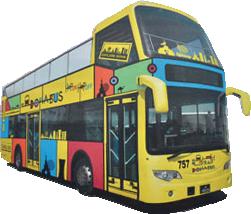




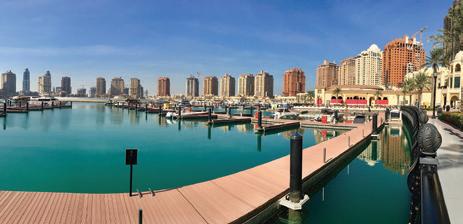
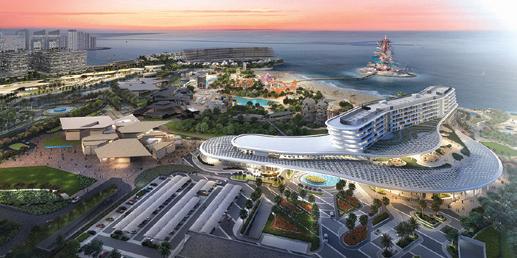

A B C D E 4 5 OldAirportStreet 56 48 49 41 42 43 40 39 37 69 66 65 64 33 63 61 62 60 66 20 1 3 13 14 15 16 17 27 26 25 24 22 23 6 7 4 5 44 46 45 45 47 47 2 10 11 12 61 Ras Bufontas Qatar Free Zone Qatar Free Zone Fox Hills North Beverly Hills Lusail Crescent Park Fox Hills South Place Vendome WOQOD WOQOD WOQOD Marina District QIPCO QT MOCI Doha Heliport Imam Muhammad Ibn Abdul Wahhab Al Mourjan Cruise Ship Terminal Museumof IslamicArt Doha Port Viva Bahriya Oyster Diplomatic Club Marsa Katara Porto Arabia Medical City Lusail City Island Island Qatari Diar Katara Hospitality Katara Legtaifiya Lagoon Doha Golf Club Ooredoo Hotel Park Tornado Tower Alfardan Tower Barzan Financial Square Al Jabor Vision Marhaba Jarir Cafe Batteel QNA AlBidda Park Amiri Diwan MIA Park Souq Waqif Qatar Sports Club Honda Civil Defence MoI HQ QBS QTV Khalifa Tennis & Squash Complex Qatar National Theatre Qatar Post Sub-station Commercial Avenue Meteorology Drainage Dept Qatar Red Crescent Kahramaa Awareness Park Kahramaa QDC Mesaimeer Services Indian Cultural Centre Tank Farm Immigration Regency Halls Ministry of Education Al Jazeera Qatar Centre Hamad Ambulance Fire Station Rumailah NCCCR Heart Vet Surgery Capital Police Concourse C D A B E Gulf Warehousing Gulf Times Arrayah ME & HE Airport Al Ahli Sports Club Darwish Travel CAA Al Arabi Club Rawdat Al Khail Park Al Emadi Hospital DOHA HOP-OFF BUS SIGHTSEEING ROUTE stops at MarriottHotel SharqVillage&Spa Fisherman’sWharf MuseumofIslamicArt TheCorniche OrrieOryx CityCenter-Doha HotelPark HiltonHotel InterContinentalHotel Katara ThePearl-Qatar LagoonaMall AlBiddaPark SouqWaqif NationalMuseumofQatar GrandMosque QNCC AlShaqab MathafMuseum National Museumof Qatar Palm Towers Jarir Bookstore BoxPark The Pearl Hamad International Airport (HIA) Katara Al Dafna DIA Arrivals DIA Departures Doha Int’l Airport (DIA) Ras Bu Abboud Beach 974 Alfardan Gardens Le Mirage Al Jazi Gardens Alfardan Gardens 3 Banana Island Resort Doha by Anantara Chevrolet Al Mana Chrysler Ford AAB Nissan Volvo Nissan Porsche Abu Bakr Al Mansoura Free Zone Oqba Ibn Nafie Al Matar Al Qadeem Umm Ghuwailina Al Doha Al Jadeda National Museum Souq Waqif Bin Mahmoud Al Sadd Joaan Al Bidda Corniche DECC Al Qassar Katara Legtaifiya Hamad Hospital White Palace Msheireb HIA T1 Ras Bu Abboud West Bay 5/6 Int’change Lusail Stadium Stadium 974 Al Thumama Stadium Arch at Intersection of Al Tarfa and Lusail Streets AlWakra Rd AlFadaillSt Abu AyyoubAl Ansari St NajmaSt ERingRd Oqba Bin Nafie St Ras Bu Abboud St NajmaSt E Ring Rd AirportSt DRingRd C RingRd C R n g R d Ras Bu Abboud St Grand Hamad St Al Corniche St Dafna St AlBiddaSt Onaiza St OmarAlMukhtarSt Lusail St Al Khafji St Wadi RawdanSt UniversitySt LagoonSt Legtaifiya St asuL i l tS Lusail Street AlTarfaStreet Lusail Boulevard AbdulAzizBinJasimSt AlMarkhiyaSt Ahmed Bi n AliSt Onaiza St MohammedBinThaniSt Al BiddaSt Road Jawaan S t Al Sadd St uS h a m B i n Hamad S t Bin Mahmoud St A Khal ee j S t WadiMushairebSt Expressway SalwaRoadAliBinAbiTalibSt HaloulSt D Ring Rd Rawdat Al Khail St AlMaadeedSt IndustrialAreaRd UmmLekhbaI/C – H d Ai t SabahAlAhmad Corridor Najma St B Ring Rd AlCorniche Ghaf St OmarAlMukhtarSt arkh y a S t Lusail Towers AlFunduqSt SabahAlAhmadCorridor UmmLekhbaI/C–HamadInt’lAirport CRingRoad Ideal Indian Qatar Ind Tech Al Jazeera Academy Park House Pak Education Centre Doha Modern Indian MES TEK Cambridge Girls Summit KG American Academy King’s College Berlitz Egyptian Language Qatar Skills Academy Girls Creativity Centre Montezine Newton Int’l German School Doha Doha Academy Elder Tree Nursery IAID Skills Development Center New Aslata Park CCoQ Debakey Edison SEK 5/6 Park CCoQ Kanga’s Pouch Lycee Voltaire Newton Chouiefat Newton Institut Francais du Qatar Shafallah Centre Newton Qatar Aeronautical College AhmedBinSaif Mesaimeer AirForceI/C Asiri 21 High St Al Meera Lagoona Mall Al Meera Al Hazm City Center Town Centre The Centre Al Mirqab Mall Family Food Centre Al Meera Al Meera Al Asmakh Mall Royal Plaza The Gate Zaks Uniform Store LuLu Family Food Centre The Mall Shoprite Al Meera Safeer Doha Mall QanatQuartier 1 Abraj Quartier Perlita Gardens Floresta Gardens 2 4 6 7 10 12 14 15 18 20 22 23 29 31 30 LaCoisett e L a C e tte Beach Novo Cinemas Beach GewanIsland Medina Centrale Medical Commission Mesaimeer Omar Bin Al Khattab Al Muntazah West Bay Al Ahli Hospital Doha Clinic Hospital American Hospital Turkish Hospital Staybridge Suites Hilton The Pearl Al Liwan Gulf Pearls Alwadi Park Hyatt Al Muntazah Plaza Rawda St. Regis Marsa Arabia Island Cielo Movenpick Saraya Jouri Marsa Malaz Kempinski Grand Hyatt Ritz-Carlton Mondrian The Chedi Katara Al Qassar Resort Katara Hills InterContinental Residences InterCon The City Hilton The Curve W Dusit Four Seasons Sheraton Wyndham Warwick Le Park Central Inn The Avenue Banyan Tree Sharq Village & Spa Sheraton Westin Doha La Cigale Millennium Swiss Belinn Musherib Ramada Encore Victoria Concorde Premier Inn Doha Airport Hotel Crowne Plaza Holiday Inn Steigenberger Safir Strato by Warwick Hyatt Regency Oryx Doha Holiday Villa Al Mansour Suites Radisson Blu dusitD2 New Blue Rose Le Royal Meridien Waldorf Astoria Century DoubleTree Al Sadd Sterling Sedra Arjaan by Rotana (Tower 26) Four Points Oryx Airport Hotel Oryx Garden Hotel Women’s Bin Zaid Afghanistan B3 Albania B4 Algeria C4 Argentina B3 Armenia B3 Australia C4 Austria C4 Azerbaijan B4 Bangladesh D4 Belarus B3 Belgium C3 Benin C3 Bosnia&H B3 Brazil B3 Brunei B3 Bulgaria B3 BurkinaFaso B3 Canada C4 C.AfricanRep B3 Chile C4 China B3 CostaRica C3 Croatia B3 Cuba B3 Cyprus C4 Djibouti B4 Dom.Rep. B3 Ecuador B4 ElSalvador B4 Eritrea E4 Eswatini B4 Ethiopia B4 France C4 Gambia E4 Georgia C4 Germany C4 Ghana B3 Greece B4 Hungary B3 India C4 Indonesia D3 Iran C4 Iraq C4 Italy C4 IvoryCoast B4 Japan B4 Jordan C4 Kazakhstan B3 Kenya B3 Korea (S) B4 Kosovo C4 Kuwait C4 KyrgyzRep C3 Lebanon B4 Liberia C4 Libya B3 Malaysia C4 Mali B4 Mauritania C4 Mexico C4 Moldova B4 Morocco C4 Nepal E3 Netherlands C4 Niger C3 Nigeria C4 NorthMacedonia C4 Oman B4 Pakistan C4 Palestine C4 Panama B4 Paraguay B4 Peru C3 Philippines B3 Poland B4 Portugal C4 Romania C4 Russia B4 Senegal C3 Serbia B3 Singapore B4 Somalia C4 SouthAfrica B3 Spain B4 SriLanka E4 Sudan B4 Sweden C4 Switzerland B3 Syria C4 Tajikistan C3 Tanzania C4 Thailand C4 Tunisia C4 Turkey B4 Uganda B3 Ukraine B3 UnitedKingdom C4 UnitedStates ofAmerica C3 Uruguay C3 Venezuela B4 Vietnam B3 EMBASSY LOCATIONS Meryal Waterpark AlSa’ad Plaza Qetaifan Island Lusail Winter Wonderland Doha Sports Park Icon Tower Yacht Club Promenade Marina Qetaifan Island North The Pearl Island Raffles and Fairmont Hotels are housed in the iconic Katara Towers Al Fardan Tower Tornado Tower Palm Tower B West Bay North Beach See our detailed map of the area south of Doha MAP of AL WAKRA
New Procedures to Support Businesses in Qatar
By Sarah Palmer
The authorities in Qatar have introduced two new important decisions as part of efforts to support businesses and the local economy.
Local value system to be used for government tenders
In August 2022, The Amir, HH Sheikh Tamim bin Hamad Al Thani ratified Cabinet Resolution No 11 of 2022, amending some provisions of the Executive Regulations of the Law on Regulating Tenders and Auctions No 24 of 2015.
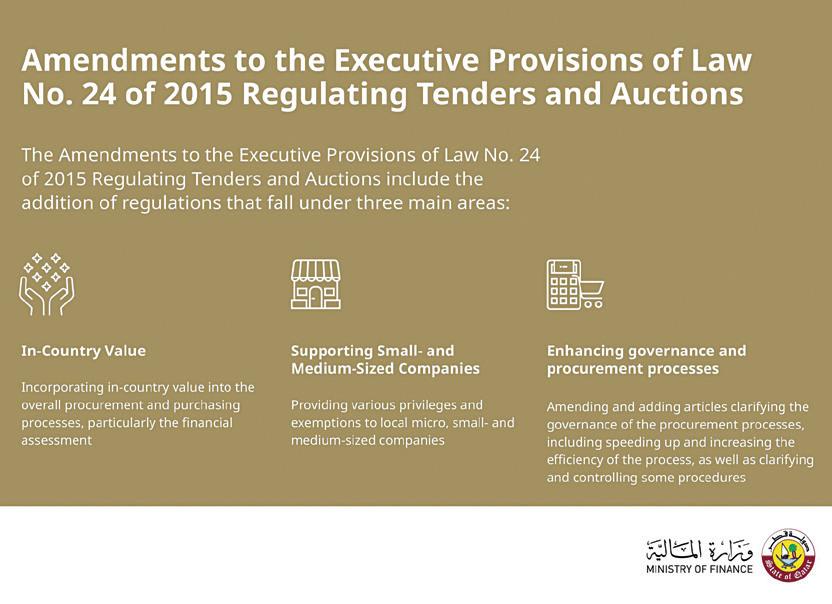
Under these amendments, procurement processes in Qatar will now implement the in-country value (ICV or local value) system – companies will now have to add ICV or local value certificates to their financial bids.
The ICV certificates will be used as a measurement tool during the awarding of tenders to companies. Now, national products, companies with high local value, and those submitting the least expensive monetary bids after ICV calculation will be given preference during the procurement processes. Micro, small and medium-sized enterprises (MSMEs) will also now receive greater privileges and exemptions with more tenders available to them, according to the Ministry of Finance (MoF). MSMEs, which are defined by the Ministry of Commerce and Industry (MoCI), are now permitted to have limited participation in tenders valued under QAR5 mn. These companies are waived from bid and performance bonds and tender fees, providing their turnover is less than QAR1 mn, and are exempted from half the value of the fee prescribed for classification.
The decision to amend the law is to increase the participation of non-oil sectors and the private sector in the local economy.
According to Nayef Al Hababi, Director of Government Procurement Regulations Department at the MoF: 'Perhaps one of the most important additions to the regulation is defining the local value of
companies, which means the total amount spent by the contractor, supplier or service provider within the country to develop national business, services or human resources to stimulate productivity in the local economy. The local value is determined through a certificate of previously executed contracts and the plan presented by the bidder within his bid.'
The amendments also provide for clear guidelines on the timeframe for awarding tenders. Government agencies must organise the offering procedures within 60 working days, and sign the contract within a period not exceeding 20 working days from the date of the contractor submitting the final insurance. The contract must be implemented within 90 working days after its signing, but no later than 180 days.
Specifying the duration of the procedures in the amended Executive Regulations aims to speed up procedures, improve the efficiency of tenders, and not incur any losses caused by the length of the previous procedures period.
The new system is expected to provide valuable opportunities for local business owners, and attract foreign investors to set up businesses in Qatar.
The ICV system was previously in place for some government tenders in the oil and gas sector. The Ministry of Finance (MoF) launched the TAHFEEZ programme in 2021, aimed at enhancing local services and products in an effort to strengthen Qatar’s private sector and homegrown companies. The programme has three pillars: Qatar In-Country Value (QICV); Environmental, Social and Governance (ESG); and Small and Medium Enterprises (SMEs).
The QICV pillar was launched in February 2019 and is itself an extension of QatarEnergy's Tawteen programme. Phase 1, starting in Q1 2022, was available to contractors in collaboration with the Public Works Authority (Ashghal), before extending to other government entities and institutions.
FEATURE
QATAR BUSINESS AND ECONOMY E-GUIDE © MARHABA
Ministry of Commerce and Industry launches provisional commercial licence service
The Ministry of Commerce and Industry has joined forces with the Ministry of Interior and the Ministry of Labour on a new initiative, launching a service to issue provisional commercial licences.
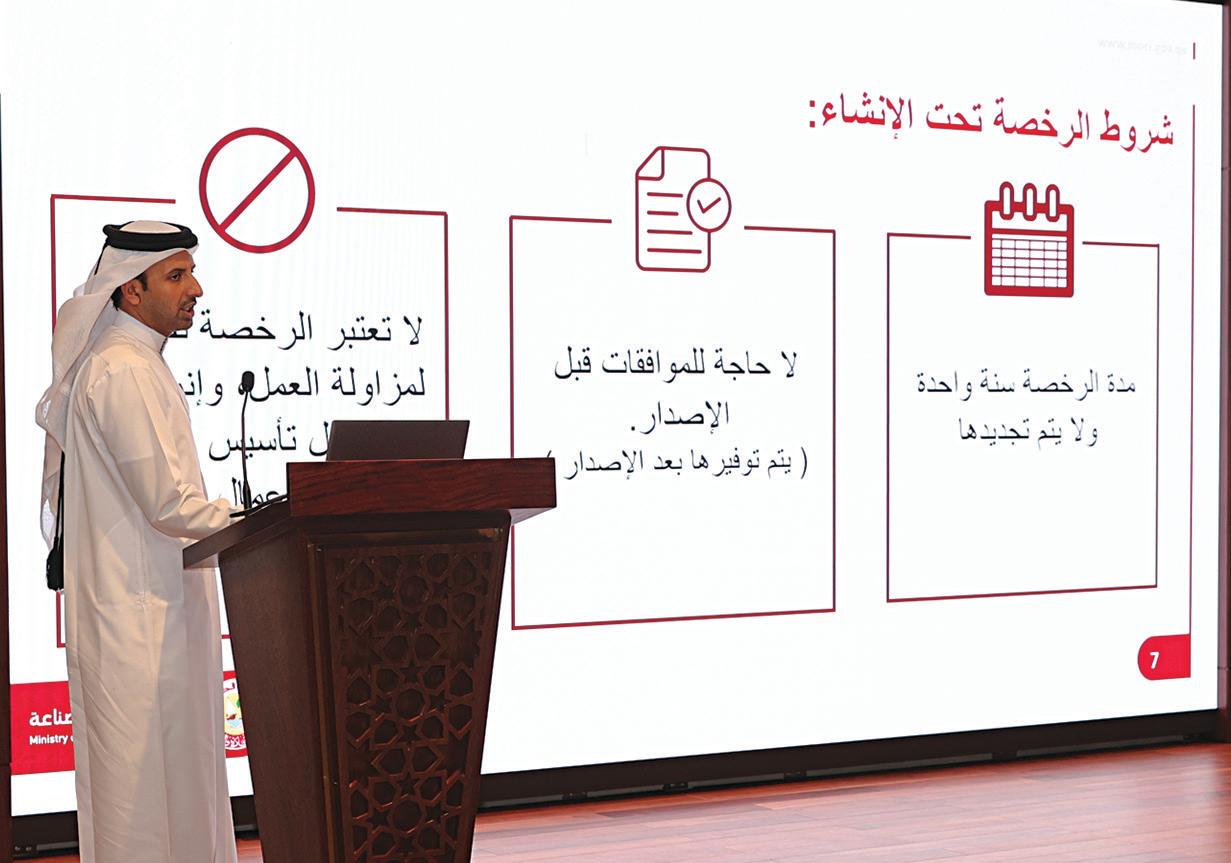
This is available for all commercial activities except for 'administrative offices', such as contracting, limousine and cleaning services.
The initiative is part of national efforts to support the private sector and ease the procedures for doing business in Qatar, while also allowing investors time to establish their business, complementing new online services and streamlined procedures.
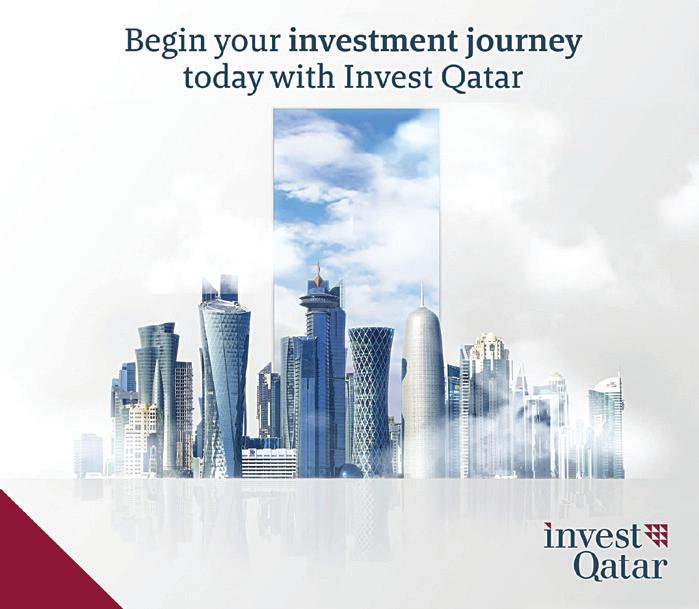
According to the Ministry, the following conditions should be noted for the issuance of a provisional commercial licence:
• The provisional licence is valid for one year only, and it can only be renewed with the approval of the relevant authority.
• The provisional licence is issued without external approvals, so long as all necessary approvals are obtained when the final commercial licence is issued.
• The provisional commercial licence is not a permit to begin operating, but offers a period of time to establish business sites and obtain approvals from third parties – registration of the establishment, receiving labour approvals, provision of raw materials for the commercial project, adhering to any bank procedures and requirements, etc.
• A note will be placed in the title description, to the above condition's effect: 'a provisional licence, valid for one year from the date of issuance of the commercial licence. Practising the commercial activity is prohibited before all requirements are met.'
There are two stages for the issue of a provisional licence. Under Stage I, these requirements must be met: licence application form (provisional licence); lease agreement acknowledgment form; construction completion certificate, a building permit, or a contract with the State; and a copy of the applicant's ID card. A provisional commercial licence can then be issued.
Stage II takes effect after the expiry of the provisional commercial licence, ie after one year, when applicants must submit the Civil Defence Certificate and the construction completion certificate (if not submitted in Stage I).
Applicants must also abide by certain provisions of Law No 5 of 2015 on Commercial, Industrial and Similar Public Stores and Street Vendors.
Article No 7 states that:
• The relevant department will decide on the licence application, informing the applicant of its decision the same day, providing the applicant has provided all requested documents.
• The applicant must fulfil any and all general and special requirements, as per the type of licensed activity, before practising the commercial activity. Additionally, Article No 19 states that the licence shall be revoked if there are changes to the business site or licenced activity without receiving prior approval, if the business becomes inoperable, or does not meet the conditions stated in the licence.
Under Article No 20 'the licence shall be revoked in cases other than those stipulated in the previous article, if the public interest so requires.'
Any violations of Law No 5 of 2015 will attract penalties: imprisonment for a period not exceeding one year, and a fine of not more than QAR50,000, or either of these penalties, shall be imposed.
For more information on government tenders, visit monaqasat.mof.gov.qa, The Unified Website of State Procurement. For setting up business in Qatar, see Investment and Trade in this section, and visit moci.gov.qa and investor.sw.gov.qa
© MARHABA WINTER 2022/23
m
Banking and Finance
Banking and Finance
Bank Telephone Website
Regional Banks
Ahlibank 4420 5222 ahlibank.com.qa
Commercial Bank of Qatar 4449 0000 cbq.qa
Doha Bank 4445 6000 qa.dohabank.com
Qatar Development Bank 4430 0000 qdb.qa
Qatar National Bank 4440 7777 qnb.com
Branches of Foreign Banks
Arab Bank Qatar 4438 7777 arabbank.com.qa
Bank Saderat Iran 4441 4646 bsi.com.qa
BNP Paribas 4453 7115 mea.bnpparibas.com
HSBC 4442 4722 hsbc.com.qa
Mashreq Bank 4408 3333 mashreqbank.com/qatar
Standard Chartered Bank 4465 8555 sc.com/qa
United Bank Limited 4444 1314 ubldirect.com
Islamic Banks
Dukhan Bank * 800 8555 dukhanbank.com
Masraf Al Rayan # 4425 3333 alrayan.com
Lesha Bank § 4448 3333 qfb.com.qa
Qatar International Islamic Bank 4484 0000 qiib.com.qa
Qatar Islamic Bank 4402 0888 qib.com.qa
Investment Banks
QInvest 4405 6666 qinvest.com
* Prev. Barwa Bank; merged with International Bank of Qatar in April 2019
# Merged with Al Khalij Commercial Bank in November 2021
§ Prev. Qatar First Bank; name changed in October 2022
The Banking Network
Currency and Exchange
Alfardan Exchange 4453 7777 alfardanexchange.com.qa
Al Jazeera Exchange 4436 3822 aljazeeraexchangeqatar.com
Al Mana Exchange 4442 4226 almanaexchange.com
Al Sadd Exchange 4432 3334
Al Amir Street
Arabian Exchange 4443 8300 arabianex.com
Gulf Exchange 4438 3222 gulfexchange.com.qa/en
Travelex Qatar 4443 4252 travelex.qa
Unimoni Exchange 4436 5252 unimoni.com/qat
Western Union Send money online and via the app, or find a branch at westernunion.com/qa/en
There are hundreds of bank branches and ATMs across the country, with most in Doha but also further afield. They are located in nearly all of the malls, hotels, souqs and petrol stations. Visitors can usually access funds in their home accounts by using their ATM cards here, and some allow the withdrawal of USD and Euro – check with the relevant bank(s) for commission or exchange rate fees. Major credit cards are widely accepted. Exchange houses provide remittance services and foreign exchange and are licensed by Qatar Central Bank. There are no exchange control regulations, but movement of money in and out of local accounts is monitored and a declaration of origin for large cash deposits may be required. The GCCNET system, established by the GCC countries, acts as a single ATM network linking all the GCC point of sale switches – in Qatar this is NAPS (National ATM & POS Switch).
Opening hours: Generally Sunday – Thursday 7:30 am – 1 pm, however many banks have extended branch operations. Check the respective bank's website for up to date timings and locations of branches and ATMs. All day/extended hours/weekends:
Ahlibank, City Center-Doha: Saturday – Thursday 9 am – 2 pm, Friday 3 pm – 8 pm
CBQ, mall branches: Saturday – Thursday 9 am – 2:30 pm/3:30 pm – 9 pm, Friday 3:30 pm – 9 pm
Qatar Islamic Bank, Medina Centrale, The Pearl Island: Sunday – Thursday 11 am – 6 pm
QNB, City Center-Doha, Lagoona Mall and Doha Festival City: Friday 3:30 pm – 9 pm
QNB, City Center-Doha and Lagoona Mall: Saturday 9 am – 2:30 pm/3:30 pm – 9 pm
Digital branches/services:
Global digital wallet services (Apple Pay, Google Pay, Samsung Pay): All are available and accepted in Qatar
HSBC Msheireb Downtown Digital branch: Sunday – Thursday 9:30am – 5 pm
QIB Video Banking: via the QIB mobile app
Virtual assistants: Dukhan Bank (Rashid), Qatar Islamic Bank (Zaki)
QATAR BUSINESS AND ECONOMY E-GUIDE © MARHABA
Currency
The unit of currency is the Qatari Riyal (QAR), divided into 100 Dirhams (Dh), issued by Qatar Central Bank (QCB). It is pegged to the US dollar at a fixed exchange rate of USD1 = QAR3.64.
The fifth series of notes were introduced in December 2020. A new QAR200 note joins the QAR1, QAR5, QAR10, QAR50, QAR100 and QAR500 notes. The old notes ceased to be legal tender on 31 December 2021, although the public can change the old notes at QCB for another 10 years. Banknotes incorporate security threads, as well as special features for recognition by the blind and visually impaired, and the new QAR500 note features a holographic security thread, the first in the Middle East to do so. Coins remain unchanged at Dh5, Dh10, Dh25 and Dh50.
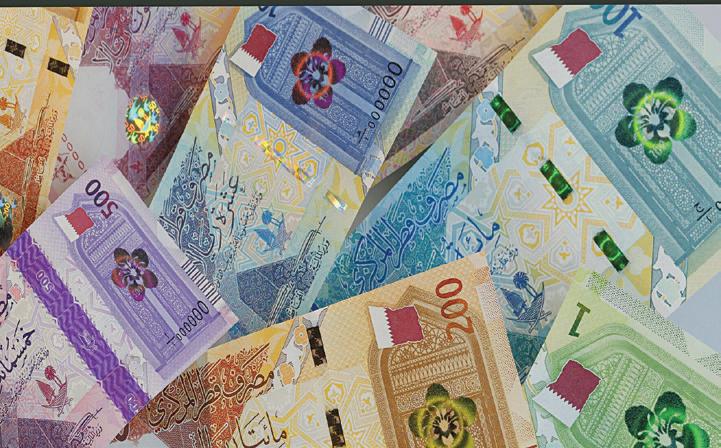
Four GCC countries support the creation of a Gulf Monetary Union (GMU) – Qatar, Saudi Arabia, Kuwait and Bahrain; the UAE and Oman have withdrawn entry. The GCC Supreme Council in 2008 approved the Monetary Union Agreement and the Statute of the Monetary Council. The headquarters of the Gulf Monetary Council opened in Riyadh in 2013 with monetary union proposed later in the year. Qatar, Kuwait, Bahrain and Saudi Arabia subsequently agreed to establish a unified central bank with currency pegged to the USD. There has been no further action since 2013.
The Banking Sector
Overseen by Qatar Central Bank (QCB), the sector comprises a number of regional, foreign and Islamic banks. State-owned Qatar Development Bank provides financing to SMEs, while QInvest focuses on investment banking, asset management and investing its own capital.
Barwa Bank and International Bank of Qatar (IBQ) signed a final agreement in August 2018 to merge the two banks, the first in Qatar's banking history, to create a Sharia-compliant financial institution with more than USD22 bn in assets. The legal merger was completed in April 2019, trading as Barwa Bank, with IBQ products converted to Sharia-compliant equivalents. Barwa changed its name to Dukhan Bank in October 2020.
In June 2020 negotiations began for another merger between Masraf Al Rayan and Al Khalij Commercial Bank (al khaliji). Masraf Al Rayan was previously involved as a third bank in the merger between Barwa Bank and IBQ. Masraf Al Rayan and al khaliji's merger agreement in January 2021 was completed in November 2021. al khaliji's business was absorbed into Masraf Al Rayan's, with the latter becoming the remaining legal entity operating in accordance with Islamic Sharia principles. It is now one of the largest Shariacompliant banks in Qatar and the region, with over QAR182 bn in total assets.
The Cabinet approved a draft resolution in December 2021, allowing a non-Qatari investor to own up to 100% of the capital in four banks: Commercial Bank of Qatar, Masraf Al Rayan, Qatar Islamic Bank, and Qatar National Bank.
A new loan-to-deposit requirement of 100% came into effect in 2018. The adoption of International Financial Reporting Standard (IFRS) 9 by QCB has strengthened the provision coverage at Qatar’s commercial banks – under the IFRS standard, banks and financial entities have to set aside a certain proportion of profit against losses for unseen reasons. QCB set up the Supreme Emergency Committee in 2018 to monitor the day-to-day activities of financial institutions in the country, addressing emergency matters and easing the flow of work.
Both the Institute of International Finance and the Economist Intelligence Unit have noted that Qatar's banking system 'remains resilient' during the COVID-19 pandemic. The ability to fully service its debt obligations is good, thanks to ample foreign reserves and the assets of sovereign wealth fund Qatar Investment Authority (QIA).
Qatar Central Bank
Under Law No 13 of 2012 Qatar Central Bank and the Regulation of Financial Services, QCB is deemed an autonomous corporate body, with a capital of QAR50 bn and under the direct control of The Amir. It is headed by a governor appointed by The Amir, and primary goals include financial stability, supporting developmental activities and strengthening the national economy. The law covers banks, insurance companies, exchange houses, Qatar Exchange and QFC-registered entities. Amiri Decision No 65 of 2021 appointed HE Sheikh Bandar bin Mohammed bin Saoud Al Thani as Governor of QCB.
Banking and Finance
© MARHABA WINTER 2022/23
marhaba.qa PRINT and ONLINE
Banking and Finance
Under Law No 13 of 2012, the Financial Stability and Risk Monitoring Committee shall study existing and future risks related to all banking, financial, insurance and stock market activities. The panel works closely with the Ministry of Finance to frame general policies.
The law provides strict penalties for anyone accepting deposits from the public without a valid licence from the banking regulator – violators can face a jail term of up to five years and/or a fine of up to QAR5 mn. For those refusing to accept the legal tender of Qatar, there is a jail term of three years and/or a fine of up to QAR5 mn. Issuing forged currency means 10 years in jail and/or a fine of QAR10 mn. Manipulating accounts incurs a prison term of up to three years and/or a fine of up to QAR200,000.
Regulations in 2013 curbed investment options for local banks. Equities and bonds can account for up to 25% of a bank’s capital and reserves; debt issued by the government and national banks are exempt. There is also a limit on the amount placed with individual companies and unlisted securities: a maximum of 5% of capital and reserves for foreign investments and 10% domestically. Total foreign equities is capped at 15%.
The Qatar Renminbi Centre opened in 2015 and is the first in the region to offer Renminbi (RMB) clearing and settlement, increasing financial connectivity between China, Southwest Asia and the MENA region. The centre provides access to China’s onshore RMB and foreign exchange markets to local financial institutions – Chinese companies have become active partners in Qatar, and the RMB centre will facilitate trade via their agreement with QCB. qatarrmbcentre.com
Law No 20 of 2019 on combating money laundering and terrorism financing was issued in September 2019, replacing Law No 4 of 2010, with implementing regulations following in December. The law is in accordance with the latest standards adopted by major international organisations including Financial Action Task Force, highlighting Qatar's regional role in setting standards in its legal and regulatory framework for combating money laundering and terrorism financing.
Fintech regulations
Noting the increasing growth and popularity of fintech, QCB has established the Fintech Regulatory Sandbox and launched Qatar FinTech Hub (QFTH) as a means of boosting financial innovation, one of the objectives of its strategic plan (see below). The regulatory sandbox, co-founded by Qatar Development Bank, invites entities to safely live-trial their services in the digital payment services space. A new fintech strategy is expected in Q4 2022. fintech.qa
The Second Strategic Plan for Financial Sector Regulation 2017–2022
QCB, the QFC Regulatory Authority (QFCRA) and the Qatar Financial Markets Authority (QFMA) jointly launched in December 2017 the Second Strategic Plan 2017–2022 for the future of financial sector regulation in Qatar, an extension of the First Strategic Plan 2013–2016. The new plan comprises five main goals:
• Enhancing financial sector regulation and promoting regulatory cooperation.
• Developing financial markets and fostering financial innovation.
• Maintaining integrity of and confidence in the financial system.
• Promoting financial inclusion and financial literacy.
• Developing human capital.
The plan aims to create a regulatory framework allowing growth, is 'inclusive and sustainable', promotes innovation and fintech, and successfully tackles cyber-security threats. qcb.gov.qa
Qatar Credit Bureau
Bad loans have been reduced since the Bureau started operations in 2011. The centre cannot grant credit facilities to individuals nor impose restrictions on banks. Qatar Credit Bureau provides analytical data and supports banks’ use of advanced techniques in risk management, as well as support sustainable growth of credit in Qatar. It provides banks with information on customers' total exposure in the market and the loans they hold, enabling banks to choose prospective customers. cb.gov.qa
Loans, Bank Charges and Interest Rates
Loans: Under QCB rules, the default period for a substandard loan is three months or more, for a doubtful loan six months, and a bad loan nine months. Banks have to closely monitor loan disbursement and forward reports on customer creditworthiness to QCB. There is also a duty to track and follow defaulting customers and seek resolution – if this fails, they will take legal action. Non-payment of loans could lead to a travel ban for Qatar and possibly the GCC.
QCB has imposed ceilings on the amounts a bank can lend as a personal loan to citizens and expatriates. Banks cannot lend more than QAR400,000 to an expatriate, over a maximum repayment period of 48 months, against a maximum 50% of total monthly salary, and at a maximum 6.5% interest rate. For Qatari citizens there is a maximum loan of QAR2 mn over a maximum 72 months. Banks cannot use post-dated cheques for the loan value.
QATAR BUSINESS AND ECONOMY E-GUIDE © MARHABA
marhaba.qa PRINT and ONLINE
Mortgages: Check with each bank first.
Documents usually required: • Valuation Report from an approved real estate agent • Salary assignment letter if the home loan is the first facility with the bank • ID for Qataris or passport and valid residence card for expatriates • Copy of the Title Deed and map • Building insurance cover. Discuss provision for life assurance against any loan amount taken and consider updating your will.
Bank charges: Banks must prominently display all interest rates on personal loans and credit cards, as well as publish them in local newspapers.
Credit cards: A maximum 12% annual interest rate and usually only issued when customers transfer their salary or have an adequate deposit at the bank.
Interest rates: Announced by QCB on overnight deposit and loan transactions between QCB and local banks via the Qatar Money Market Rate Standing Facility, a monetary instrument through which local banks can request access to loan and deposit facilities with QCB at daily interest rates. QCB and Bloomberg jointly launched the first Qatar interbank offer rate (QIBOR) fixing in 2012. This is the interest rate charged by banks in Qatar for interbank transactions.
Given the fixed parity between the Qatari riyal and the US dollar, QCB short term interest rates policies are subordinated to the fixed exchange rate policy, making QCB overnight interest rates closely related to its USD counterpart, the Fed Funds Rate. Following adjustments by the US Federal Reserve in July 2022, QCB increased the overnight lending to 3.75%, the deposit rate to 3.00% and the repo rate to 3.25%.
Accounts
Standard bank facilities: Debit/credit cards, standing orders, money transfers, personal loans, vehicle loans, and mortgages on current and savings accounts (including joint accounts). Some accounts offer longer terms, higher interest and the option to save in USD, GBP and Euros.
24/7 telephone and internet banking services and apps offer additional options, while some services such as ordering a cheque book can be accessed via the bank's ATM network. With mobile banking a customer relations officer can visit you at home or work to assist with banking requirements. Most banks offer premium banking services.
International bank account number (IBAN): Adopted in January 2014 as a standard for identifying and numbering all bank accounts in Qatar, and effective from May 2014. The system applies to all accounts in banks operating in the
country, found on bank statements or online in account details. The existing account number is not replaced; additional characters appear in front of the account number to form a 29‑character IBAN. All incoming and outgoing transfers to and from banks and financial institutions must use IBAN.
Opening an Account: Documents usually required:
• A valid residence card or work visa. A worker’s dependants (eg spouse and family) can open an account but may require his permission as he is their sponsor (check with the individual bank).
• Valid passport.
• For current accounts, a letter from the employer/ sponsor confirming the monthly salary in Qatari Riyals, with the company’s official stamp. You may have to transfer your salary to the new account but check with the individual bank.
• Some banks may ask to see your tenancy agreement to establish your residential address.
• Take copies of these documents, along with identity photographs. Ask for photocopies of any documents signed.
The Wage Protection Scheme (WPS) is an electronic salary transfer system that ensures workers are paid as per their employment agreement, initiated by the Ministry of Labor and QCB. Employees therefore need a local bank account in order to receive their wages from the employer.
Cheques: A chequebook can be issued with a current account. They are not widely accepted for instant payment; post‑dated cheques are commonly used for house rental payments. The onus of responsibility is on the banks not to encash cheques before the designated date. Issuing a cheque without the necessary funds in your account is a serious criminal offence and the bank or creditor may notify the police, leading to possible prosecution.
Punishment for causing a cheque to bounce due to insufficient funds can be severe: jail terms of between three months and three years, and/ or fines of between QAR3,000 and QAR10,000. Cases being filed are on the rise in the country, mostly for cheques for large amounts, and the Capital Security Department records all cases electronically to speed up the process.
Under new QCB instructions, the Qatar Credit Bureau lists individuals and companies who have issued at least one bounced cheque. Banks are not obligated to issue new cheque books to these customers unless the amount has been settled and their name removed. Banks must also report any customer who has issued a bounced cheque.
Banking and Finance
© MARHABA WINTER 2022/23
marhaba.qa PRINT and ONLINE
Banking and Finance
marhaba.qa
Credit cards: Widely available with all the usual privileges, with the credit limit determined by the cardholder's salary or savings balance. Family members may also be eligible for a card. Check at the time of applying for issuance and renewal fees, conversion charges, and payment options.
Customers should notifiy their bank when travelling overseas and wishing to use their credit/debit cards. Since 2014 all card transactions made using the magnetic stripe inside and outside of Qatar will be declined. However, as certain countries (eg the US, India and the Philippines) still use the magstripe for transactions, customers should activate their card before travelling.
Offshore banking: Offshore banking can be a secure anchor for an expat's finances while out of their home country. Check with local banks for availability of international bank accounts in USD, GBP, or Euros.
Complaints: Unresolved consumer complaints can be made online to QCB's Consumer Protection Department. qcb.gov.qa
Cash transactions
above QAR50,000 prohibited!
Council of Ministers' Decision No 10 of 2022 prohibits the use of cash in transactions of more than QAR50,000. All such transactions can now only be made via credit card, debit card, cheque or bank transfer. It applies to the sale, purchase and rental of all types of properties, in addition to their modifications. The law also restricts the use of cash to purchase vehicles of all kinds, maritime transportation, all precious metals, gemstones, jewellery camels, horses, livestock, and falcons, whether single or flocks.
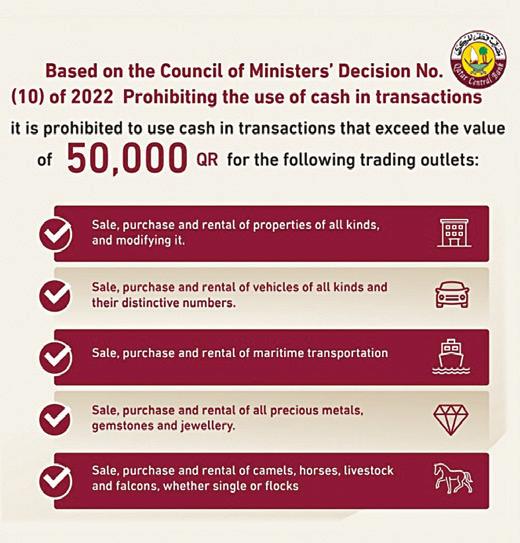
The move comes as part of efforts to combat money laundering and terrorism financing, as well as a move towards a cashless society.
Financial Services and Insurance
Financial services are provided by entities registered with the Qatar Financial Centre (QFC). Insurance products are widely available from local and international companies (see Living in Qatar).
Under Law No 13 of 2012 QCB and the Regulation of Financial Services, only local insurance providers are permitted to underwrite any kind of risk against properties in Qatar. Decision No 1 of 2016 issued by the Governor of QCB provides instructions related to licencing, regulation and controls, risk management, accounting, and other requirements. Listed companies must have capital in excess of QAR100 mn or a risk-based capital, while unlisted companies must have capital higher than that set by QCB or their risk-based capital.
QCB continues to regulate and develop the insurance market under the Second Strategic Plan for Financial Sector Regulation 2017–2022. Decision No 7 of 2019 sets out further instructions for licensing, organising and supervising the services of supporting insurance providers. It sets out the competencies and expertise, the nature of the work, areas of responsibility and functions, and the establishment of professional and ethical codes of conduct.
Islamic Finance
Current Islamic institutions include Dukhan Bank, International Islamic, Masraf Al Rayan and Qatar Islamic Bank. Qatar First Bank – regulated by the QFC Regulatory Authority – is the first independent, Sharia compliant investment bank.
Banks were required by QCB to separate their Islamic and conventional lending operations by 31 December 2011. Islamic banking by other conventional banks is now barred from Qatar's market. QCB took this action due to certain supervisory and monetary issues, namely that holding both Islamic and non-Islamic deposits incurs different risks and reporting methods.
Law No 13 of 2012 requires that Islamic banks must have a Sharia board with at least three qualified members approved by the shareholders. Neither they nor members of their family may be employed or hold shares in the entity.
Institutions and services must abide by regulations set out in the Holy Quran and Sharia (Islamic Law). Charging riba (interest) is haram (forbidden). Islamic banks charge fees for services and engage in profit sharing, enabling them to offer comparable facilities to those of conventional banks. Under a mudharabah (profit sharing) contract, the rabbul maal (owner of the money) authorises the bank to invest funds as per Sharia to make justifiable returns. Other concepts of Islamic banking include wadiah (safekeeping), musharakah (joint venture), and ijarah (leasing). Bai (saving) is halal (allowed).
QATAR BUSINESS AND ECONOMY E-GUIDE © MARHABA
PRINT and ONLINE Checked & Updated October 20 22
m
Our main role is to organise business interests and represent the Qatari private sector locally and globally as well as support the country’s economic actors and productivity
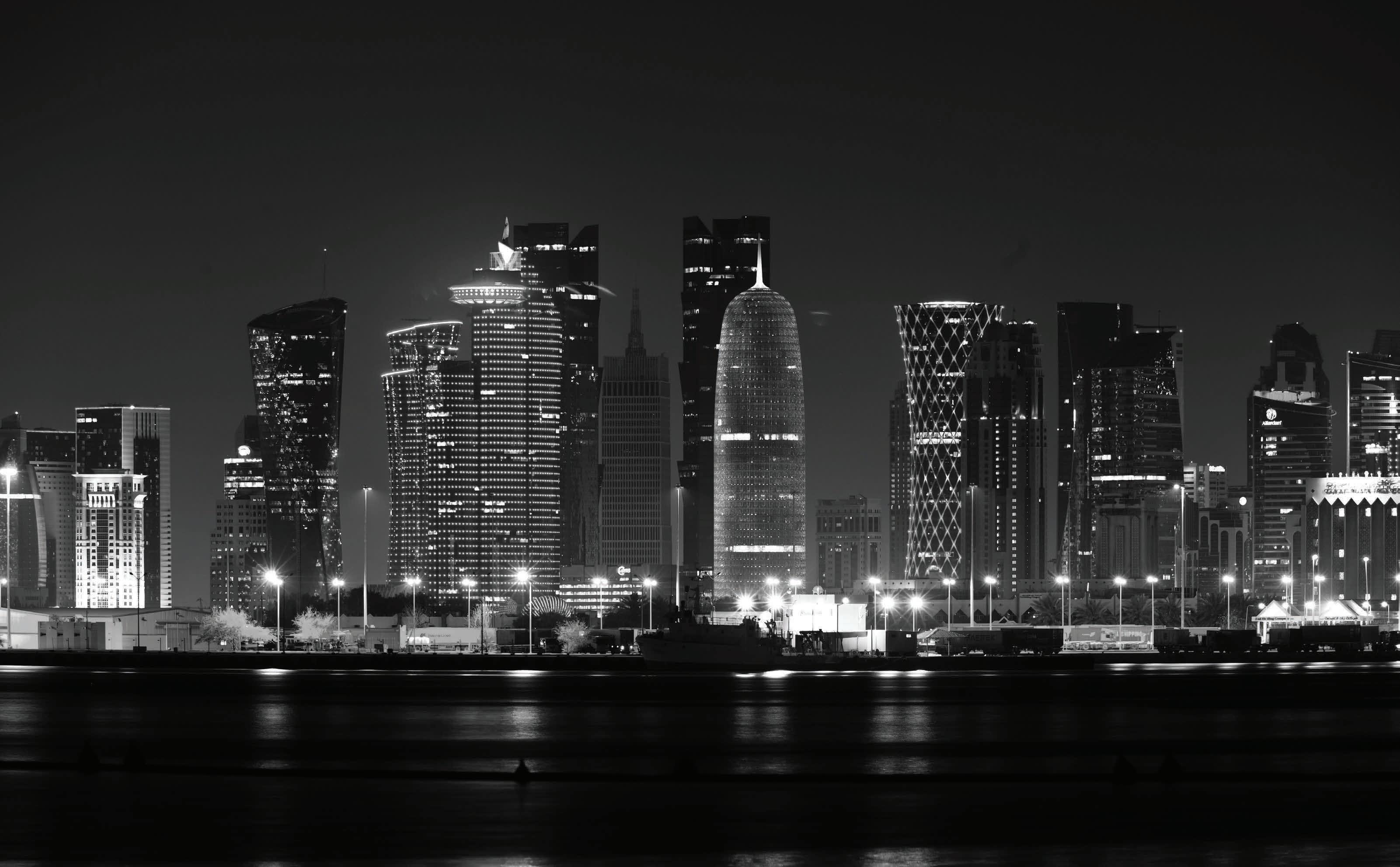
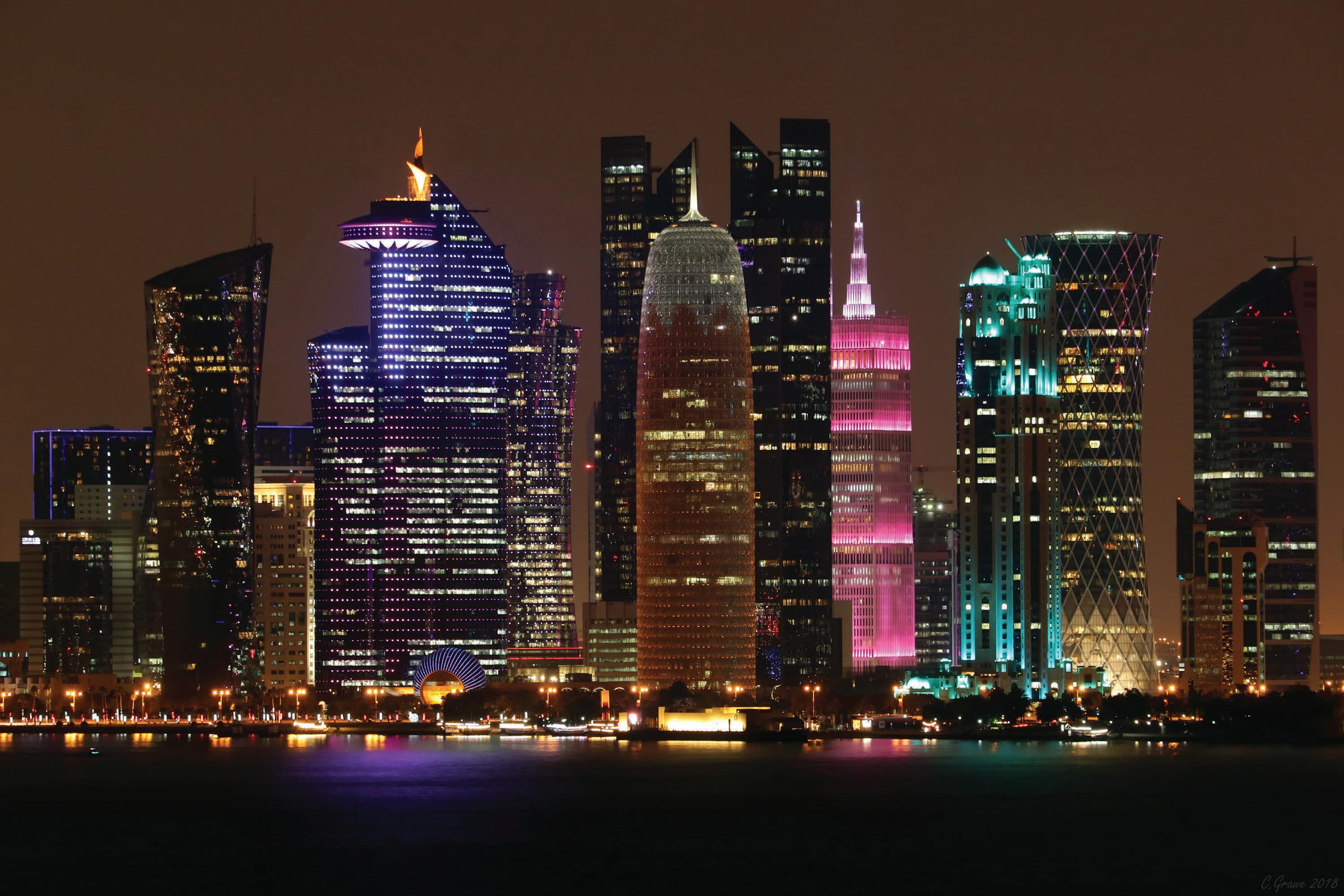
© MARHABA WINTER 2022/23
www.qatarchamber.com info@qcci.org qatarchamber qatar_chamber
Economy
Economy
Economic Growth and Gross Domestic Product (GDP)
One of the main aims of Qatar National Vision 2030 is to diversify the economy and reduce dependence on the hydrocarbon industries.
The economy has weathered the impact of both the COVID-19 pandemic and the blockade that was imposed on 5 June 2017, with positivity after borders reopened between Saudi Arabia and Qatar following the AlUla Declaration in January 2021. Hydrocarbon exports were not affected.
Qatar's Economic Outlook Report 2021–2023, released by the Planning and Statistics Authority (PSA) in January 2022, estimates that the economy will recover in 2021 by 1.5% to 2.3%. It is expected to recover further in 2022, between 1.6% and 2.9%, mostly from the recovery of non-oil activities, with a growth rate of 2.8% to 4.7%.
The Arab Monetary Fund (AMF) stated in August 2022 that Qatar's economy is expected to grow by 4.4% this year and 3.6% in 2023, thanks to activities related to the FIFA World Cup Qatar 2022TM, and the growth of both non-hydrocarbon activities and contributions from the global gas market.
According to PSA, Qatar’s quarterly Gross Domestic Product (GDP) at current prices was QAR174.266 bn in Q4 2021. According to the Investment Promotion Agency Qatar in its policy paper on Circular Economy, 'Qatar is set to generate an additional USD17 bn by 2030, corresponding to 10% of its GDP, as well as create an estimated 9,000 – 19,000 jobs by 2030, increase disposable income, and attract more greenfield foreign direct investment (FDI).'
Export, Import and Trade Surplus
In July 2022, the total exports of goods (including exports of goods of domestic origin and re-exports) amounted to around QAR44.4 bn, an increase of 12.4% month-on-month (m-o-m) and an increase of 61.9% y-o-y. The y-o-y increase was mainly due to higher exports of petroleum gases/other gaseous hydrocarbons. India was the main country of destination, followed by Japan and South Korea.
Imports of goods in July 2022 was around QAR9.6 bn, an increase of 2.9% m-o-m and an increase of 21.8% y-o-y. China was the main country of origin, followed by the US and India. The foreign merchandise trade balance – the difference between total exports and imports –showed a surplus of QAR34.8 bn, an increase of nearly QAR4.6 bn or 15.3% m-o-m and an increase of QAR15.2 bn or 78.0% y-o-y.
The Budget
The State Budget for 2022 was announced in December 2021, been based on a conservative average oil price of USD55 a barrel, up from USD40 in the 2021 budget. HE Ali bin Ahmed Al Kuwari, the Minister of Finance, stated this was thanks to a recovery in global energy prices. The oil revenue for 2022 has been estimated at QAR154 bn, up 26.6% on the previous year.
Despite the implications of the COVID-19 pandemic on the global economy during the last two years, the State budget sees a significant increase compared to the previous year. There is an increase in revenues by 22.4% to QAR196.1 bn and an increase in expenditure by 4.9% to QAR204.3 bn, largely due to a temporary increase in current expenditure related to the hosting of the FIFA World Cup Qatar 2022TM This gives a budget deficit of an estimated QAR8.3 bn, to be covered by the Ministry of Finance (MOF) from available resources or via debt instruments in domestic and international financial markets, as required.
The 2022 Budget shows that QAR74.0 bn has been allocated for major projects. The State will continue work on development projects related to infrastructure, citizens’ land development and public services.
As seen in previous budgets, investment continues to focus on the education and healthcare sectors. Allocation for the education sector is QAR17.8 bn (8.7% of total expenditure), some of which will be directed towards the expansion of schools and educational facilities. There is QAR20 bn (9.8% of total expenditure) for the healthcare sector, for a number of projects and initiatives to improve the quality of healthcare services.
Inflation and Cost of Living
For July 2022, the Consumer Price Index (CPI), used to calculate inflation rates in Qatar, reached 103.65 points, an increase of 0.49% m-o-m and an increase of 4.98% y-o-y. The Arab Monetary Fund (AMF) stated in August 2022 inflation in Qatar is expected to be around 4.3% in 2022, declining to 3.5% in 2023.
Population and the Labour Force
Total population in August 2022 was 2,937,800: males 2,136,084; females 801,716. The Labour Force report for Q2 2021 showed the number of salaried workers decreased by 1.7% and the unemployment rate was 0.1%.
Sources of information: International Monetary Fund (IMF); Ministry of Finance (MOF); Planning and Statistics Authority (PSA); Qatar Central Bank (QCB)
Checked & Updated October 202 2
m QATAR BUSINESS AND ECONOMY E-GUIDE © MARHABA
Qatar is a member of the World Trade Organisation and its trade policies create a competitive international trading market. The government supports the growth and success of businesses in a bid to diversify the economy. Qatar is a member of the Gulf Cooperation Council (GCC), which also includes Bahrain, Kuwait, Oman, Saudi Arabia and the United Arab Emirates. Following the ending of the blockade, Qatar has resumed trade with Saudi Arabia, the UAE, Bahrain and Egypt, and has continued to strengthen relations with a number of other countries such as Turkey, Oman, Kuwait, India, the UK and the US.
Organisation
Telephone Online Map
American Chamber of Commerce in Qatar 4020 6038 amchamqatar.org C4 Communications Regulatory Authority 103/4406 9938 cra.gov.qa C4 Department for International Trade (UK) +44 (0)20 7215 5000 gov.uk
General Authority of Customs 4445 7457 customs.gov.qa C4
German Business Council Qatar 4431 1152 gbcqatar.qa C4
Hukoomi (Qatar e-Government) 109/4406 9999 hukoomi.gov.qa/en C4
Mada Assistive Technology Center 4459 4050 mada.org.qa C4
Ministry of Commerce and Industry 16001 moci.gov.qa A4
Ministry of Communications and IT 4473 3333 mcit.gov.qa C4
Ministry of Education and Higher Education 155 edu.gov.qa C4
Ministry of Finance 16020/4446 1444 mof.gov.qa C4
Ministry of Justice 137/4021 5555 moj.gov.qa C4
Ministry of Municipality 184/4434 8888 mme.gov.qa C4
Ministry of Public Health 4407 0000 moph.gov.qa C3
Ministry of Transport 16016/4045 1111 mot.gov.qa C4
Planning and Statistics Authority 4495 8888 psa.gov.qa C4
Public Works Authority (Ashghal) 188/4495 1111 ashghal.gov.qa C4
Qatar
Qatari
Qatari
Qatar
Qatar
Qatar
Qatar
Qatar
Qatar
Qatar
Qatar
Qatar
QFC
Embassies can provide valuable information on commercial activities and can connect you with their business council/chamber of commerce – see the Discovering Qatar section for contact details. Translation services can be found in Day to Day Qatar in the Living in Qatar section.
Commerce
Business Forum
British
4496 2000 qbbf.com C4
Businessmen Association
4435 3120 qataribusinessmen.org C4
Business Women Association 4420
See
9109
Facebook/Instagram pages
Chamber
4455 9111 qatarchamber.com D4
Development Bank
4430 0000 qdb.qa D4
Stock Exchange 4433 3666 qe.com.qa C4
Financial Centre (QFC) 4496 7777 qfc.qa C4
Intl Court & Dispute Resolution Centre 4496 8225 qicdrc.com.qa C4
Investment Authority 4499 5919 qia.qa A4
Professional Women's Network qpwn.org
Science & Technology Park 4454 7070 qstp.org.qa C2
Tourism 4406 9921 visitqatar.qa A4
Commerce Checked & Updated October 2022 m marhaba.qa PRINT and ONLINE © MARHABA WINTER 2022/23
Regulatory Authority 4495 6888 qfcra.com C4
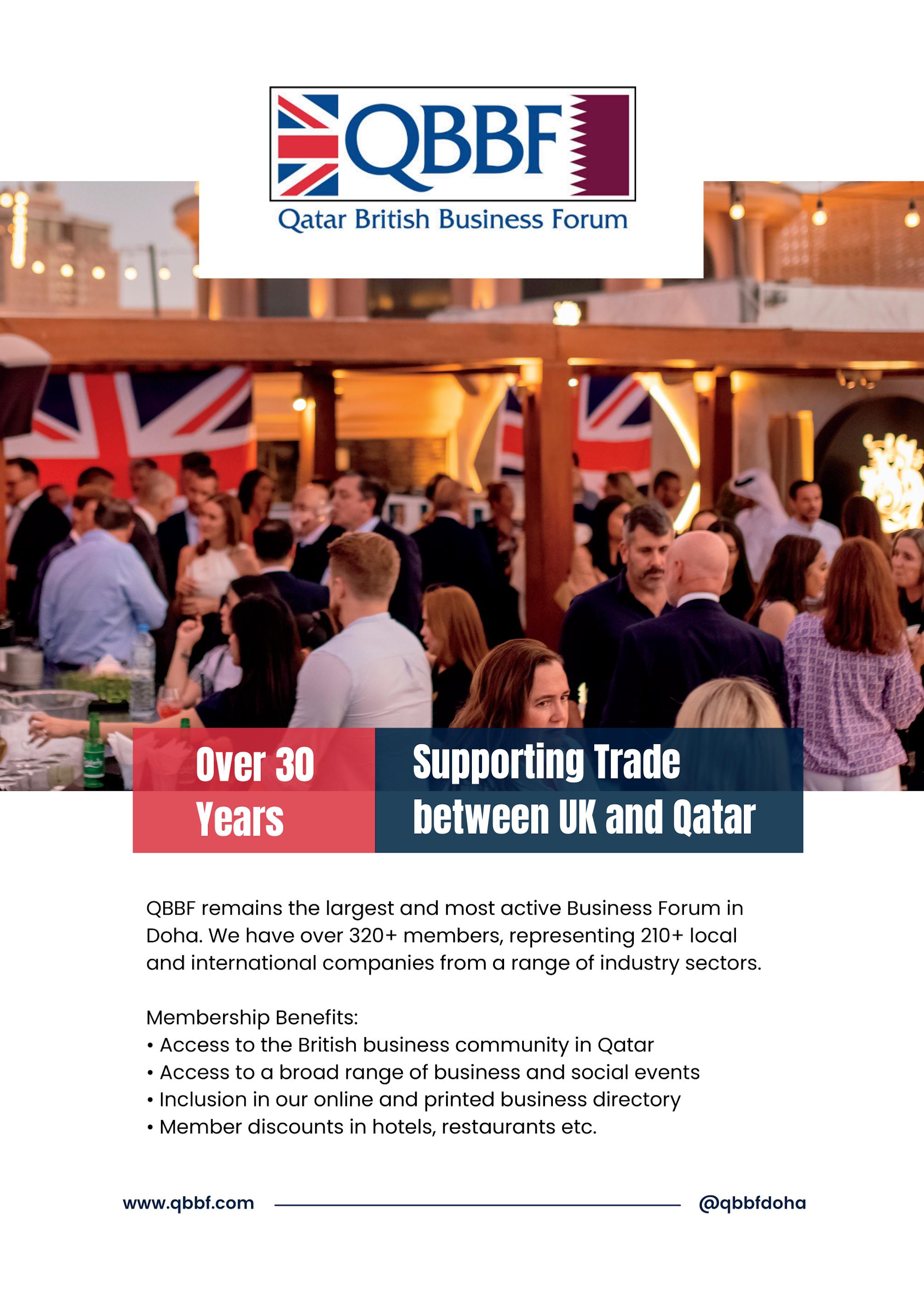
QATAR BUSINESS AND ECONOMY E-GUIDE © MARHABA
Investment and Trade
Qatar has one of the fastest growing global economies thanks to the third largest concentration of natural gas reserves in the world. Recent legal liberalisation, economic diversification and an expanding economy provides many investment opportunities for non-Qataris. Investors can enjoy unrivalled world connectivity via Hamad Port, one of the largest in the region, and the world’s best airport, airline and air cargo carrier. Profits can be repatriated as can proceeds of sale and capital on liquidation. Major investment sectors are construction, oil and gas, education, and financial and legal services, with opportunities in ICT, sport, leisure and healthcare.
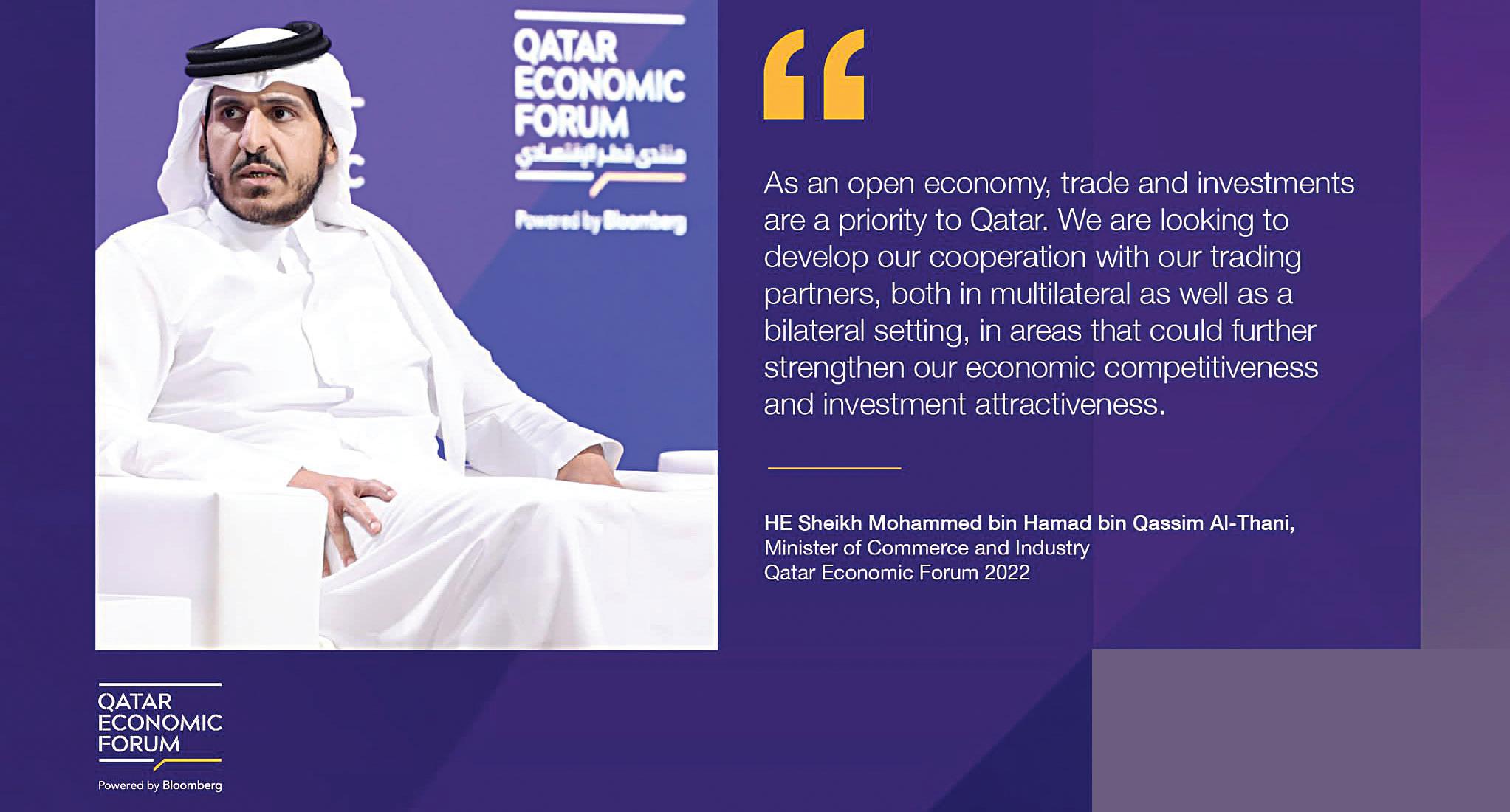
Incentives
The government welcomes foreign participation in joint ventures, with a number of incentives for investment:
• A developed infrastructure and ICT network.
• Easy access to world markets with good sea and air connections, continuously being upgraded.
• Natural gas, electricity, water and petroleum at subsidised rates.
• Land for development in the Industrial Area near Doha for nominal fees – companies can submit a request to the Ministry of Municipality for a lease contract of a plot under the Doha, Al Khor, Al Dakhira and Al Shamal Municipalities.
• Loans available from Qatar Development Bank.
• Fixed parity between the Qatari riyal and US dollar (USD1 = QAR3.64).
• No customs duty on the import of plant machinery; exemption from export duty.
• Five-year renewable tax holidays (based on government approval).
• No income tax on the salaries of expatriates.
• Tax on the profits of foreign-owned stakes in Qatari companies applied at a flat rate of 10%.
• Employment and immigration rules enabling the import of skilled and unskilled labour.
Investment Regulations
There are primarily two regulatory jurisdictions for foreign investors seeking to conduct commercial business in Qatar: the regulations of the State of Qatar, and the rules and regulations of the Qatar Financial Centre (discussed in more detail below).
Qatar also recently introduced new free zones designed to encourage certain bespoke investment vehicles to bring their businesses to the region.
Non-Qatari investors may only invest in Qatar in accordance with Foreign Investment Law No 1 of 2019:
• In January 2019 the Amir promulgated the new foreign investment law of 2019. According to the new law, foreign investors are permitted to hold more than 49% in commercial companies with special permission from the Minister of Commerce and Industry (MOCI) (subject to some prohibitions set out below). Under the former law such increased ownership was limited to those businesses operating in a specific set of sectors.
• Non-Qatari investors are prohibited from being appointed as commercial agents under Commercial Agencies Law No 8 of 2002, but the former prohibition preventing foreigners from investing in real estate businesses has been removed under the new Foreign Investment
Investment and Trade
© MARHABA WINTER 2022/23
marhaba.qa PRINT and ONLINE
Investment and Trade
marhaba.qa
Law. Approval from the Council of Ministers is required for foreign investment in banking and insurance.
• Foreign capital is protected against expropriation (although the State may acquire assets for public benefit on a non-discriminatory basis, provided the full economic value is paid for the asset).
• Subject to Ministerial approval, a foreign company performing a specific contract in Qatar may set up a branch office if the project facilitates the performance of a public service or utility.
• A non-Qatari company operating in Qatar under a Qatari government concession to extract, exploit or manage the State's national resources is exempt from the Foreign Investment Law. In practice this covers all large oil and gas companies.
• A company formed by a non-Qatari entity with the government or a government entity ('Article 207 Company') may be subject to special rules and exemptions from the Commercial Companies Law No 11 of 2015.
• All international companies securing mega infrastructure development work must share at least 30% of the contract with local entities.
• Law No 7 of 1987 governs the practice of commercial activity by GCC citizens in Qatar, and was amended in April 2017 under Law No 6 of 2017. GCC citizens as individuals or legal personalities can practice retail and wholesale trade in Qatar. However, the GCC citizen engaging in the activity must be directly responsible for it. Those undertaking retail business must do so via direct sale to customers in a shop, and those in wholesale trading are required to import and export the goods. NB: following the signing of AlUla Declaration regarding the blockade against Qatar, legal advice is recommended for this type of commercial activity.
• Law No 12 of 2020 regulating the partnership between the public and the private sector became law in July 2020, as per one of the following regulations: Allocation of land through a rental or usage licence, for development by the private sector; build-operate-transfer (BOT); buildtransfer-operate (BTO); build-own-operate-transfer (BOOT); operations and maintenance (OM); or any other form adopted by the Prime Minister, upon the proposal of the relevant minister. The Government or other administration may, on its own initiative or at the suggestion of the private
sector, identify a project for its implementation through partnership.
Choosing A Business Structure
To conduct business in Qatar on a regular basis, foreign investors are required to establish or register a legal presence from the following options:
• Incorporating as a company under the Commercial Companies Law which allows full access to Qatar's market and to work on an unlimited number of projects. A Qatari partner is required to own 51% of the capital of the company, except in the circumstances mentioned above. Various exemptions are available to attract foreign capital.
• Obtaining a licence for a branch office or trade representation office which does not require a Qatari partner. The licence for a branch is granted in respect of a specific project for a government client. The existence of the branch office is dependent on the duration of a particular project: once the project is completed, the branch office must close unless it has secured additional qualifying projects. Branch offices are only permitted to perform a specific contract and may not engage in general commercial activities with the larger local market. The branch will be fully taxable unless granted a special exemption. Trade representation offices are only permitted to market goods and services; they are not permitted to engage in commercial activities.
• Under Law No 7 of 2017 companies in GCC states can now establish companies in Qatar, subject to having had a commercial registration in one of the GCC states for at least three years, and be fully owned and managed by a GCC citizen. Refer to the preceding caveat in Investment Regulations regarding the blockade.
• Appointing a commercial agent means a nonQatari company does not establish a presence in Qatar; instead a 100% owned Qatari entity or Qatari national is appointed as an agent to market the relevant goods and services. Commercial agencies must be exclusive and registered in order to be afforded the protections provided under the Commercial Agents Law No 8 of 2002; non-registered distributorships are subject to the Commercial Law No 27 of 2006.
• There is a separate regime for establishing an entity in the Qatar Financial Centre (QFC).
This allows 100% foreign ownership and aims to attract international financial services companies and some professional support companies
QATAR BUSINESS AND ECONOMY E-GUIDE © MARHABA
PRINT and ONLINE
to invest in Qatar. The number of permitted activities in which a QFC firm may engage has been increased to include a broader spectrum of investment options.
• The Qatar Science and Technology Park, a free zone in Education City, allows companies to engage in research and development, again with full foreign ownership.
• The new Qatar Free Zones have started accepting applications and international investors, at these zones:
° Um Alhoul, a 30 sq km site adjoining Hamad Port, south of Al Wakra – offers easy access to the water for maritime and logistics companies, and is a gateway for imports and exports. A port and marine cluster, 'Marsa', is able to support a wide range of marine businesses.
° Ras Bufontas, a 4 sq km site adjacent to Hamad International Airport – a technology and manufacturing hub for businesses requiring international connectivity.
• The Cabinet has added some areas to the Free Zones Law, including Msheireb Downtown Doha.
• Under Ministerial Decision No 242 of 2016, the MOCI will grant licences for small businesses at home conducting certain commercial activities including sewing, events services, electronic services, business services, cosmetic activities and food activities. A single license is issued per activity, with an annual fee, and cannot involve direct sales to the public from the residence. Decision No 163 of 2018 cancelled the requirement for signage at the house entrance.
Company Structures
According to the Commercial Companies Law No 11 of 2015, the following structures are permitted:
• Limited liability companies (LLCs) – subject to the Foreign Investment Law can now be established by a single person owning the entire share capital (previously the minimum number of shareholders was two). This replaces the single person company under the old companies law. Shareholders can determine the share capital of an LLC (previously the minimum share capital was QAR200,000 divided into equal shares).
• Article 207 company – a shareholding company where the Qatari government, a government owned entity or a public corporation must own 51% of the shares, unless the Council of Ministers consents otherwise. Certain provisions of the Commercial Companies Law are excluded from the company’s Articles of Association.
• General partnership – joint partners administer the affairs of the company, and trustee partners contribute to the company's capital.
• Simple limited partnership – a local entity formed by two or more Qataris.
• Limited partnership with shares – formed by joint partners, liable for the debts, or trustee partners, whose liability is limited to the share value.
• Unincorporated joint venture – formed by two or more people pursuant to specific contractual arrangements. The unincorporated joint venture does not have a separate legal personality distinct from its partners.
• Joint stock company (public or private) – the capital is divided into shares with a minimum of five shareholders. Permissible foreign share ownership depends on the type of company and is subject to Qatar Financial Markets Authority approval.
• Holding company – incorporated as a joint stock or limited liability company. The holding company must hold at least 51% of the shares in each of the companies under its control.
Commercial Registration (CR)
Virtually all companies use a government liaison officer or facilitator to assist with establishment formalities. Under Qatar Commercial Registration Law No 25 of 2005, companies must be approved or registered by one or more of the following entities: Ministry of Commerce and Industry (MOCI); Qatar Chamber; Ministry of Municipality; Ministry of Interior; Importers' Register/ Contractors' Register; and QFC Authority (where appropriate). Visit moci.gov.qa for details.
Amendments were made under Law No 20 of 2014 in order to expedite registration procedures, followed by Decisions 30 and 31 of 2019:
• The MOCI must respond to the applicant's request for registration on the same day.
• Reasons must be given for rejected applications. The Minister must accept or reject an appeal of the Ministry's decision within 15 days.
• Incorporated branches must be in the exact name of the principal company, and are not considered separate legal entities.
• Amendments have also been made to penalties for those operating commercial premises without a CR, misusing the CR, and providing false/ wrong documents.
• Provisional licences and renewals are now possible online, with the relevant fees, at gov.qa
Investment and Trade
© MARHABA WINTER 2022/23
PRINT and ONLINE
marhaba.qa
Investment and Trade
Export and Import
Exports According to the Planning and Statistics Authority (PSA), Qatar’s total exports (including exports of domestic goods and re-exports) in July 2022 amounted to QAR44.4 bn, for such things as petroleum gases/other gaseous hydrocarbons, mainly to Asia. There are no duties on exports.
Imports According to PSA, imports in July 2022 totalled QAR9.6 bn, for crude materials, manufactured goods, chemicals and mineral fuels, from China, the US and India.
Import tariffs Importers of goods into Qatar must sign up to the Importers' Register and be approved by Qatar Chamber (QC). Customs duty and legalisation fees are levied on all commercial shipments, irrespective of its value. All goods imported into Qatar are subject to customs duties, based on a percentage value of goods (usually 5%), or on a 'per unit' basis. Effective from May 2021, incoming parcels and personal shipments with a cost, insurance and freight (CIF) value exceeding QAR1,000 is liable to 5% customs duties (previously QAR3,000).
Customs duty tariffs fall under these categories:
• Personal effects and household items, imports of charitable organisations and returned goods, diplomatic and military exemptions, merchandise for ‘free zones’ and duty-free shops – exempt. Goods in transit may be accepted at designated stations without duty.
• General cargo, eg clothing, perfumes, cars, electronic appliances and devices – 5%.
• Steel – 20%.
• Urea and ammonia – 30%.
• Cigarettes, tobacco and its derivatives – 100% or QR1,000 per 10,000 cigarettes, whichever is higher.
Law No 25 of 2018 on Excise Tax came into effect 1 January 2019. All businesses that import, produce or store/stockpile excise goods must comply with the requirements stipulated under the law. The following goods are subject to Excise Tax:
• Tobacco products – 100% • Carbonated drinks (non-flavoured aerated water excluded) – 50%
• Energy drinks – 100% • Special goods – 100%
In accordance with the Gulf Cooperation Council (GCC) Customs Union, more than 800 goods are exempted from customs duties, alongside exemptions granted to certain bodies and persons under Customs Law No 40 of 2004. There are fees for the attestation of the Certificate of Origin (from QC) and a tariff for the attestation of the Commercial Invoice, based on shipment value.
Qatar implemented the World ATA Carnet Council in 2018, an international customs system with nearly 80 member countries, permitting the dutyfree and tax-free temporary import and export of goods for up to one year. The system is being implemented by QC alongside ICC Qatar and the General Authority of Customs (GAC).
Import regulations All commercial shipments are examined by GAC prior to clearance. The Qatar Electronic Customs Clearance Single Window (Al Nadeeb) is a one-stop e-government system to facilitate international trade. customs.gov.qa
New regulations were introduced in 2013 to prevent fake products from entering the market. All general goods must have non-removable marking of their place of manufacture to be eligible for customs clearance. This applies to both air and sea freight. The import of vehicle tyres, spare parts and electrical home appliances has to be based on a 'certificate of conformity' issued by the authority concerned. All general cargo for customs clearance must be backed by an original commercial invoice on the shipper’s letterhead, with stamp and signature. They also require attestation by QC. The packing list of each consignment must have the number of pieces, weight and volume.
GAC requires all importers to obtain an HS Code, an international system for classifying traded products. This must be linked to the trader's Commercial Registration and import licence.
There are few restrictions on bringing personal effects into Qatar. However, anyone (importers, exporters or travellers) holding local or foreign currency, precious metals or jewellery worth more than QAR50,000 must complete a customs declaration form upon entry into or departure from the country. Banned imports include alcohol, pork and e-cigarettes. The import of pets is allowed, although certain breeds are not permitted. NB: The signing of AlUla Declaration regarding the blockade against Qatar means commercial cargo movement has resumed between Qatar and Saudi Arabia.
Points of entry Imports and exports are transitted via Hamad International Airport, Hamad Port, Doha Port, Mesaieed Port, Ras Laffan and the Salwa Overland Terminal.
Taxation
There are no personal taxes or statutory deductions from salaries in Qatar. Under Law No 24 of 2018 on Income Tax ('the New Tax Law') and its executive regulations, companies must pay tax on all profits at a flat rate of 10%. This is on all corporate income from sources in Qatar,
QATAR BUSINESS AND ECONOMY E-GUIDE © MARHABA
marhaba.qa PRINT and ONLINE
whether the entity has a physical presence in Qatar or not. The share of the profits due to a Qatari or GCC partner is exempt from tax.
Tax exemption applies for certain activities, and companies listed on the Qatar Exchange are also exempt, but companies are required to pay a 2.5% contribution to charitable and cultural activities. Taxpayers need to register with the Public Revenue and Taxes Department. Auditors must be a firm based in Qatar and registered with the MOCI or approved by the QFC. Taxpayers can access services offered by the General Tax Authority via the Dhareeba portal.
In January 2016 GCC member states agreed to introduce VAT, tentatively set for early 2018. The Council of Ministers approved the Qatar Value Added Tax (VAT) Law and Excise Tax Law and Executive Regulations in May 2017, based on the unified GCC agreement. To date, only the Excise Tax has been implemented.
Intellectual Property
Under Law No 9 of 2002, a trademark registration is valid for 10 years from the date of filing the application, renewable for further consecutive periods of 10 years. The court may be ordered to cancel a trademark registration if the owner fails to use it in Qatar within five consecutive years from the date of the registration.
Copyright Law No 7 of 2002 gives protection to authors of original literary and artistic works. Protected works include books, lectures, musical works, photographic works and computer software. The economic rights of the author/owner are protected during the lifetime of the author, and for 50 years after his death.
Patent Law No 30 of 2006 provides for the registration of inventions and foreign patents at the Qatar Patent Office, and implementing regulations were issued by the Minister of Commerce and Industry under Decision No 153 of 2018.
Qatar announced its accession to the Patent Cooperation Treaty in 2011. The Law of Trademarks in the GCC Countries was promulgated under Law No 7 of 2014, and the same year Qatar signed a cooperation agreement with the World Intellectual Property Organisation (WIPO) to jointly improve services. There is an electronic trademark registration service via the MOCI website to expedite submissions and preserve IP rights.
Law No 10 of 2020 on the protection of industrial designs was issued in April 2020. This will offer more comprehensive protection for designs once the implementing regulations are issued, as
previously protection was sought by publishing cautionary notices in Qatari newspapers.
Qatar recently won the presidency of the International Union for the Protection of Literary and Artistic Works (Berne Union). The Berne Union is a UN agency under WIPO, and is an agreement by member states to protect works and the rights of authors, as well as giving creators the means to place autonomy over their works. Acting Director of the office of Qatar to the World Trade Organisation (WTO) Ahmed Essa Al Sulaiti has been elected Chairman of the Committee of the Union for two years.
Regulatory Bodies and Government‑owned Entities
Investment Promotion Agency Qatar (IPA Qatar) A4 Custodian of the Invest Qatar brand, IPA Qatar was launched in 2019 and is registered at the Qatar Financial Centre. The agency provides investment solutions in Qatar, attracting foreign direct investment in all of the country’s priority sectors. invest.qa
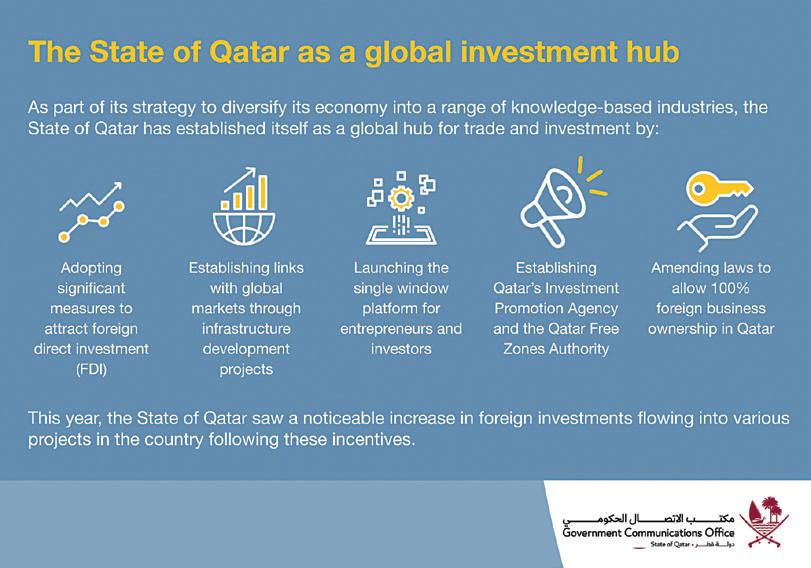
Ministry of Commerce and Industry (MOCI) A4 Creates commercial policy for both private and public sectors in order to boost regional and international trade relations and support the development of businesses across the country. The ministry is a primary resource for information when opening a company and investing in Qatar. A number of services are available through the Single Window, part of the ministry's efforts to attract local and foreign investments. moci.gov.qa, investor.sw.gov.qa
Ministry of Finance (MOF) C4 Prepares the State Budget and proposes objectives and tools of financial policy in line with Qatar National Vision 2030. Its Tahfeez programme enhances local services and products to strengthen Qatar's private sector. The General Authority of Customs monitors the import of all goods, and the e-services of the Unified Website of State
© MARHABA WINTER 2022/23
marhaba.qa PRINT and ONLINE
Investment and Trade
Investment and Trade
Procurement include tenders and company registration. mof.gov.qa, customs.gov.qa, monaqasat.mof.gov.qa
Ministry of Justice (MOJ) C4 Records legal actions and documents, registers and protects IP rights, and reviews draft contracts and agreements in accordance with the law. The Ministry has a real estate registration/authentication office at Qatar Financial Centre (QFC) to provide services to QFC entities.
Ministry of Municipality and Ministry of Environment and Climate Change C4 The Foras investment portal promotes PPPs, currently for environmental, waste treatment, recycling and sustainability projects. mme.gov.qa
Qatar Chamber (QC) D4 Provides a wide range of services and support to local and international businesses, including certificates of origin (COO) for import/export and ATA Carnet, acting as liaison for international business delegations, and providing training courses. QC services are also available to QFC-licensed firms. The Qatar International Center for Conciliation & Arbitration (QICCA) was established in 2006 as part of QC to act as an efficient and swift mechanism to settle disputes between Qatari enterprises, or between national companies and foreign counterparts. qatarchamber.com, qicca.org
Qatar Development Bank (QDB) D4 Has an active role in the economic and industrial development of Qatar in the private sector by promoting and financing SMEs. The bank is 100% owned by the State of Qatar and provides a wide range of financial and advisory products, such as funding, incubation, and support services. qdb.qa
Qatar Financial Markets Authority (QFMA) C4
An independent regulatory authority supervising the financial markets and firms authorised to conduct activities related to securities in or from Qatar, and empowered to exercise regulatory oversight and enforcement over the capital markets. QFMA was granted full membership of the International Organisation of Securities Commissions in 2013. New legislation in 2014 modernised the legal infrastructure, while listing rules and a governance code for funds were issued in 2019. qfma.org.qa
Qatar Science and Technology Park (QSTP) C2
Since 2009 QSTP has been a facility for applied research and commercialised technology in Energy, Environment, Health Sciences, and ICT. This free zone at Education City allows foreign companies to set up 100%-owned businesses in Qatar free of tax and duties. Members must have technology
development (eg applied research, development and testing of a product or service, or technology training) as their main activity. qstp.org.qa
Qatar Investment Authority (QIA)
The QIA A4 is the country's sovereign wealth fund is a major investor in Qatar, owning 50% of Qatar National Bank, 55% of Ooredoo, and 100% of Katara Hospitality, and is a key shareholder in three local Islamic banks. Subsidiaries include: Qatar Holding, a global investment house established in 2006 and licensed by the Qatar Financial Centre Authority; Qatari Diar Real Estate Investment Company, which oversees the Lusail City development among other projects; and Qatar Sports Investments, which owns football club Paris Saint-Germain.
QIA has approximately USD300 bn in assets, although the fund does not publish its holdings. Following a restructure in 2016, USD100 bn of investments in local companies were placed in a new unit, abandoning the Qatar Holding name. The new internal division, Qatar Investments, is known as QIA internationally.
QIA has reduced its direct holdings in Credit Suisse Group AG and Rosneft PJSC, and sold its share in Tiffany & Co in January 2021 to LVMH for USD1.5 bn. New investments include retail properties in New York City with Crown Acquisitions, and in Los Angeles with Douglas Emmett. The fund aims to invest USD45 bn in the US, GBP5 bn in the UK, and USD1 bn in sub-Saharan Africa. Following five years of redevelopment, 52 Champs-Elysées in Paris relaunched in 2019, home of the famous Galeries Lafayette. qia.qa
Qatar Investments Portfolio (unconfirmed): 52 Champs-Elysées, Adecoagro, Agricultural Bank of China, Asia Square Tower 1, Banyan Tree, Barclays PLC, Barwa Bank, Brookfield Property Partners, Canary Wharf Group, Claridge's/The Berkeley/The Connaught hotels, Credit Suisse Group AG, Deutsche Bank AG, El Corte Ingles SA, Empire State Realty Trust, Fahrenheit, Glencore PLC, Grupo Santander Brasil, Harrods, Hassad Food, Heathrow Airport Holdings, Hochtief, Iberdrola SA, J Sainsbury PLC, Kahramaa, Lagardère, Le Brantano!, Le Tanneur, Lifestyle International Holdings Ltd, London Shard Tower, London Stock Exchange, LVMH, Masraf Al Rayan, Mowasalat, National Grid PLC, One Ocean Port Vell, Ooredoo, Oryx Midstream Services (Oryx), Pavilion, Pulkovo Airport, Qatar Exchange, Qatar Islamic Bank, Qatar International Islamic Bank, Qatar National Bank, Rosneft PJSC, Royal Dutch
QATAR BUSINESS AND ECONOMY E-GUIDE © MARHABA
marhaba.qa PRINT and ONLINE
Shell, Siemens, Societe Fonciere Lyonnaise SA,
The Bürgenstock Selection, Total SA, Turkuvaz, Valentino Fashion Group SpA, Vente‑Privée, Vivendi, Volkswagen AG, Xstrata PLC.
Qatari Diar Real Estate Investment Company A4
Projects include: Lusail City (Qatar); Chelsea Barracks and East Village (UK); and City Center DC (US). The Qatar Railways Development Company (Qatar Rail) was formed to oversee the Qatar Rail Development Programme: the Doha Metro, the Long Distance Rail, and the Lusail Tram. qataridiar.com
Qatar Financial Centre (QFC)
The QFC C4 was established in 2005 to attract international financial institutions and firms to establish business operations in a 'best‑in‑class' international environment. There are two independent bodies: the QFC Authority (QFCA) and the QFC Regulatory Authority (QFCRA). To operate in or from the QFC, a firm needs to be incorporated or registered by the QFC Companies Registration Office, licensed by the QFCA, and for regulated activities, authorised by the QFCRA.
Advantages of establishment in the QFC include:
• A separate legal, regulatory, tax and business environment.
• 100% foreign ownership, 100% repatriation of profits, and 10% corporate tax on locally sourced profits.
• A double taxation avoidance agreement network with more than 80 countries.
More than 1,100 local and international firms are currently registered, surpassing the 2019 target of 1,000 active firms by 2022. Companies comprise investment and private banking entities, and (re)insurance and asset management firms (each of which is regulated); and consultancy service providers, law firms and financial services recruitment firms (which are non‑regulated).
The QFC is taking a major step in diversifying key economic sectors eg digital, financial services, sports, and media. An attractive incentives programme is available to multinational companies, offering free offices, highly competitive tax incentives, and seed capital to cover five years of operating expenses in return for a 10-year commitment. An enhanced registration sees complete registration applications reviewed and processed quickly, and firms have a dedicated Business Development Representative to coordinate setting up. qfc.qa
The QFCA, the commercial arm of the QFC, leads the expansion of Qatar’s financial services sector
and develops relationships with the regional and global financial community. The QFCA's strategy focuses on the creation of a global business hub for three core markets – Asset Management, Reinsurance and Captive Insurance.
The QFCRA is the independent regulatory body of the QFC, overseeing all firms conducting financial services in or from the QFC, as a combined banking, insurance and markets regulator. In 2012, the QCB Governor took over the chairmanship of QFCRA, as part of a plan to establish a single financial regime, comprising QFCRA, QFMA, QE, QCB, and the Supreme Judicial Council. qfcra.com
The Qatar International Court and Dispute Resolution Centre (QICDRC) consists of the QFC Civil and Commercial Court (First Instance and Appellate Divisions) and the QFC Regulatory Tribunal. The Court has consensual jurisdiction to hear disputes between parties from anywhere around the world and mandatory jurisdiction to hear disputes between entities registered in the QFC. There is a purpose built Alternative Dispute Resolution (ADR) centre.
Under Laws No 14 and 15 passed in September 2021, the QICDRC's jurisdiction was expanded to include the Qatar Free Zones and the Qatar Free Zones Authority, as well as matters referred to the Court or Regulatory Tribunal by any law in the State. A new practice direction on small claims, No 1 of 2022, substantially shortens the time to reach a judgment and offers a quick and efficient legal dispute resolution mechanism. qicdrc.com.qa
Qatar Stock Exchange (QSE)
QSE C4 was created in 2009 between Qatar Holding (88%) and NYSE Euronext (12%) as the successor to Doha Securities Market; Qatar Holding purchased NYSE Euronext's stake in 2013. In 2012, regulatory authority passed to Qatar Central Bank (QCB) from Qatar Financial Markets Authority (QFMA), and in 2014 Qatar was added to the Morgan Stanley Capital International Emerging Market Index. It was upgraded in 2016 to Secondary Emerging Market by FTSE Russell. Trading in treasury bills began in 2011 and in 2012 the Venture Market for SMEs was launched, after the QFMA adopted new listing and initial public offerings (IPO) rules in the secondary market.
There are 47 listed companies on the main market and 2 companies on the venture market, and 7 brokerage firms (October 2022). Residents, expats and individual companies are all able to invest.
© MARHABA WINTER 2022/23
marhaba.qa PRINT and ONLINE
Investment and Trade
Checked & Updated October 20 22
Traders must open an account with one of the brokerage firms, who will act as an intermediary for all transactions and provide a National Investor Number for a fee of QAR100. Traders must also register at Qatar Central Securities Depository (QCSD), established by QCB and licensed by QFMA to provide safekeeping, clearing and settlement of securities and other financial instruments listed on the exchange. qe.com.qa, qcsd.com.qa
Real Estate
Under Law No 16 of 2018 on the regulation of non-Qatari ownership and utilisation of real estate, implemented in March 2019, non-Qataris may own and use properties in Qatar 'in many areas according to conditions, regulations and procedures, which shall be determined by a decision of the Cabinet based on the proposal of the Committee for the Regulation of Ownership and Use of Non-Qatari Property'.
The real estate non-Qatari individuals and companies are allowed to invest in includes offices, shops, units and villas in residential complexes, and real estate development of land in specified areas, and is not limited to apartments and residential units. Cabinet Resolution No 28 of 2020, passed in October 2020, confirmed the areas in which nonQataris may own and benefit from real estate, and the terms, conditions, benefits and procedures for their ownership and use of them. This encompasses the right to free ownership of residential units inside residential complexes and shops inside malls.
Owners of property worth more than QAR730,000 will be offered residency, as well as their family, for the duration of ownership, with residency given as soon as they finalise the purchase. Owners of property worth more than QAR3.65 mn will receive the same benefits as permanent residents regarding healthcare, education, and investment in some commercial activities. The Ministry of Justice is the one-stop-shop for all transactions regarding non-Qatari ownership of real estate.
Business etiquette
Freehold developments
The number of areas non-Qataris can own and use freehold property has been increased from three to nine designated areas:
• Al Qassar (administrative area 60)
• Al Dafna (administrative area 61)
• Onaiza (administrative area 63) • West Bay (66)
• The Pearl Island (66) • Lusail (69) • Al Khraij (69)
• Jabal Theyleeb (69) • Al Khor Resort (74)
Foreign companies can also own properties in these nine areas. The law offers an atttractive new investment model to Qatar, offering 100% guaranteed return on investment in these areas.
Leasehold developments
Non-Qataris can use real estate property for 99 years in 16 designated areas:
• Msheireb (area 13) • Fereej Abdelaziz (14)
• Doha Al Jadeeda (15) • New Al Ghanim (16)
• Al Refaa and Old Al Hitmi (17) • Aslata (18)
• Fereej Bin Mahmoud (22 and 23)
• Rawdat Al Khail (24)
• Mansoura and Fereej Bin Dirham (25)
• Najma (26) • Umm Ghuwailina (27)
• Al Khulaifat (28) • Al Sadd (38)
• Al Mirqab Al Jadeed and Fereej Al Nasr (39)
• Doha International Airport area (48)
All of these areas can be found on the map of Greater Doha in the Discovering Qatar section. m
Doing business in Qatar relies on personal relationships as well as the quality of the company or service. Networking and exchanging business cards is important. Men should wear suits or smart/business casual, women should cover upper arms and knees. When meeting Arab people of the opposite sex it is best to wait for them to initiate a handshake. Some other cultural nuances: • Don't rely too much on email • Oral commitments at meetings may be deemed binding, written agreements may not • Appointments should be reconfirmed on the day • English is widely spoken, however the language of government is Arabic • Chat with your host on general matters before approaching business.

QATAR BUSINESS AND ECONOMY E-GUIDE © MARHABA
PRINT and ONLINE Developers and Real Estate Agents Selling Property and Land (for letting agents see Living in Qatar) Cushman & Wakefield 4483 7388 Direct Real Estate 4442 1472 Just Real Estate 4491 3300 New Methods 4410 8000 United Development Company 4409 5155
Investment and Trade marhaba.qa
Checked & Updated October 20 22
CONFERENCE & EVENTS FACILITIES
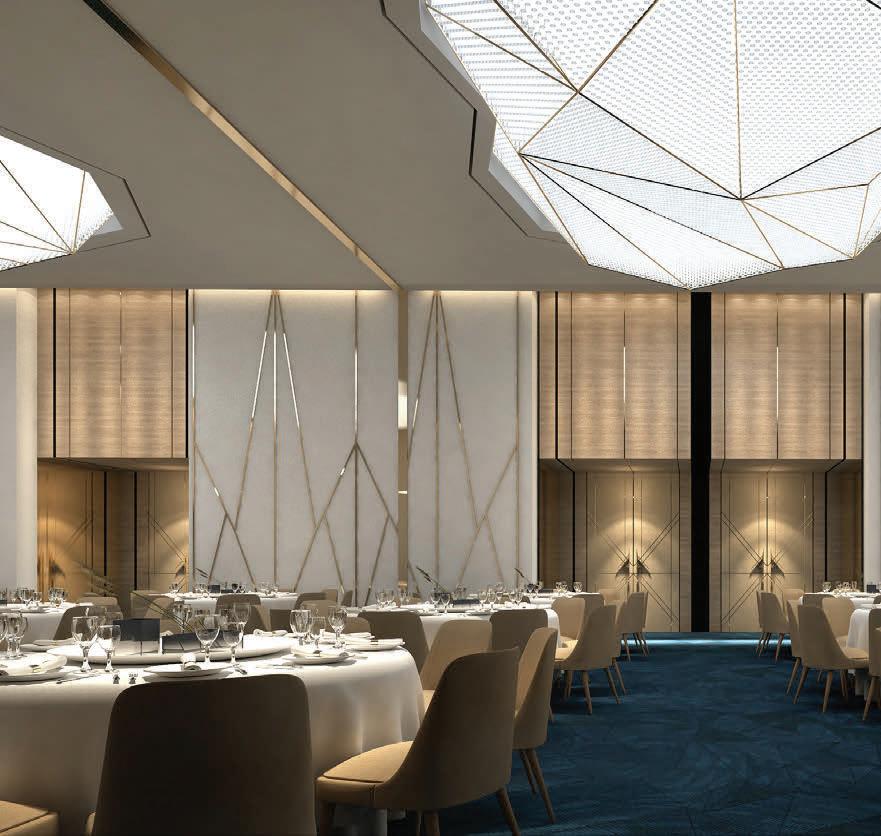
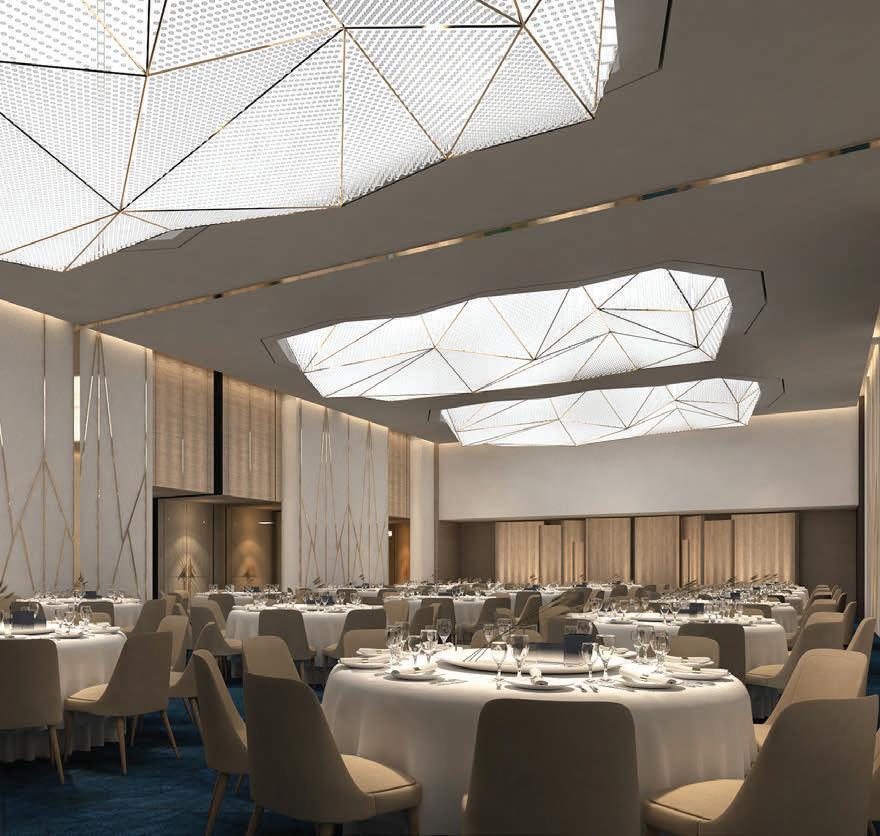
Elegantly designed to cater to all of your needs, equipped with an array of audio-visual equipment and high-speed internet access with ample parking space. The facilities include the Grand Ballroom, four meeting rooms, and a business center along with prayer rooms for him and for her.
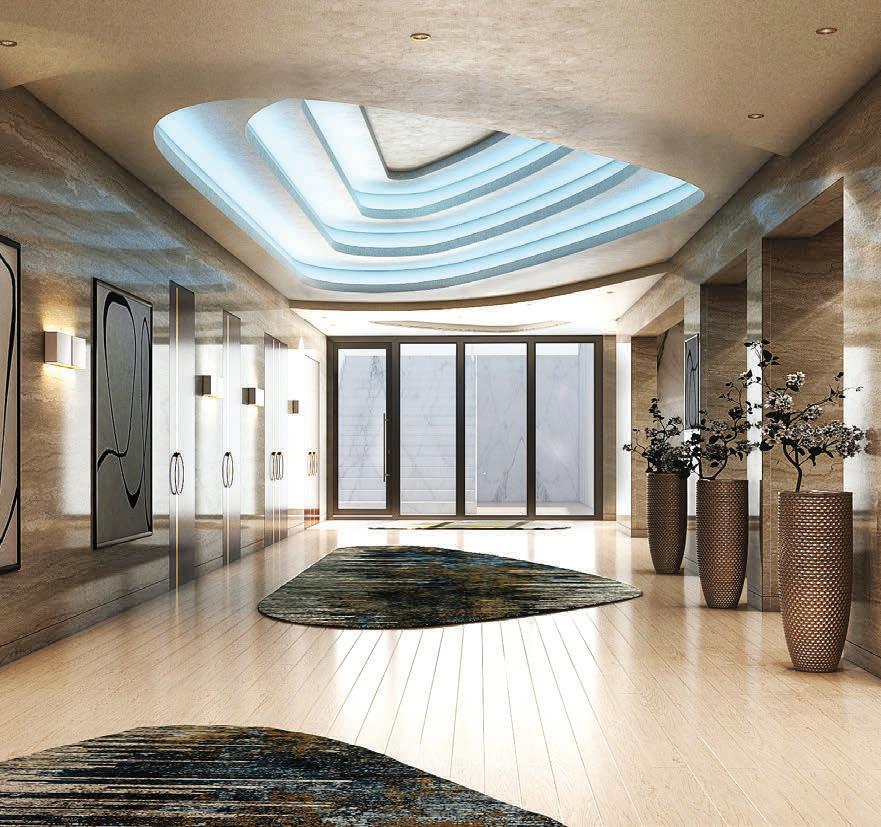
In addition, our hybrid suite meeting facilities offer the perfect choice to deliver exceptional online conference events.
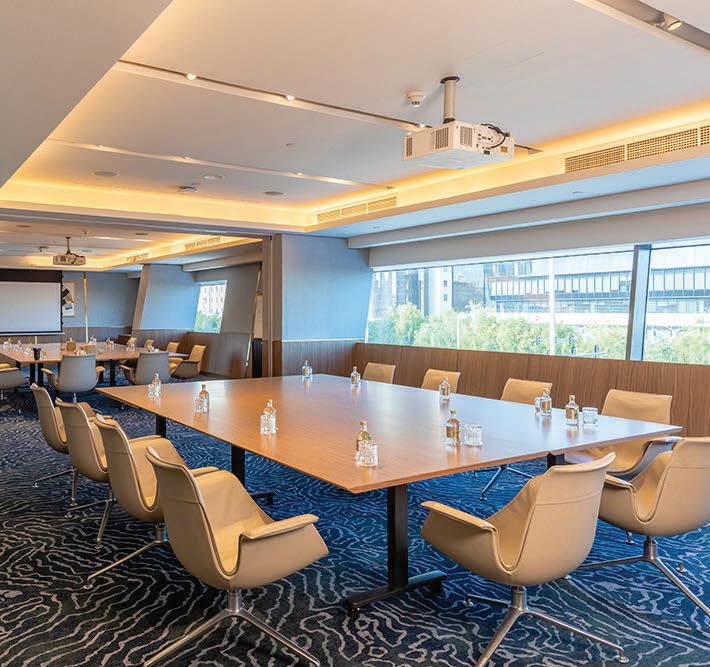

STEIGENBERGER HOTEL DOHA Zone 26 | Street 310 | Building 82 | PO Box 13102 T +974 4020 1666 | E info.steigenbergerdoha@steigenberger.com steigenberger.com
Grand Ballroom
Meeting Rooms
Meeting Rooms © MARHABA WINTER 2022/23
Grand Ballroom
Data Privacy Protection Law Guidelines Issued
By Sarah Palmer
Recognising the need to develop an international regulatory and legal framework in order to protect the digital sovereignty and data privacy of individuals and businesses in Qatar, Personal Data Privacy Protection Law (PDPPL) No 13 of 2016 was issued.
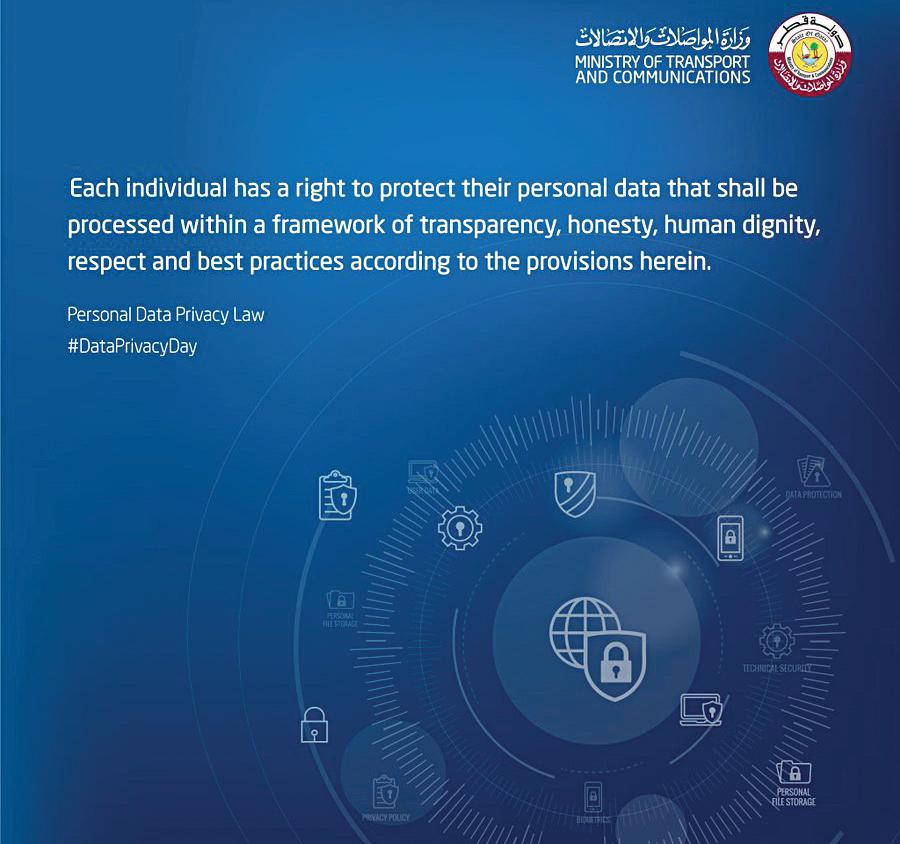
The law includes provisions related to the rights of individuals to protect the privacy of their personal data. Article 2 states that this refers only to personal data that is electronically processed, or obtained, gathered or extracted for use electronically, or when a combination of electronic and traditional processing is used. However, it does not apply to personal data processed by individuals privately or within a family context, or to any personal data gathered for official surveys and statistics, as per Law No 2 of 2011 on Official Statistics.
Under the law, businesses are banned from sending direct marketing messages electronically without obtaining an individual’s prior consent, and that consent is required from individuals before their personal information can be used by another entity.
Organisations must also adhere to basic data protection responsibilities. This includes, but is not limited to, ensuring data handlers receive training and that precautions in place to 'protect personal data from loss, damage, modification, disclosure or being illegally accessed.'
Protection is given to personal data of a private nature, such as information relating to race, religious beliefs, children, health, relationships and criminal records – this may only be processed after obtaining permission from the Ministry of Transport and Communications (MoTC).
Additionally, in order to protect the youngest members of society, Article 17 states that the owner or operator of any website related to children must put up a policy about how it manages the information of minors. Website owners/operators must also get the consent of the child’s parent when processing their information.
It should be noted that entities that operate within the Qatar Financial Centre (QFC) are subject to the QFC's own Data Protection Rules and Data Protection Regulations from 2005.
The need for the law and the guidelines According to Dr Ahmed Elmagarmid, Executive Director at Qatar Computing Research Institute, speaking at a recent online panel discussion, 'most nation states have data related laws to strengthen their nation's ability to act independently in the digital world. However, there is a lack of collaboration among nations in developing international regulations or laws on data sovereignty and privacy.'
He added that there have been more than 600 state-sponsored cyber-attacks in the last decade, and that the rate is increasing. 'There is a lack of international law or accord to regulate the use of cyberwarfare or the Geneva Convention equivalent for cyberwarfare. Also, one of the challenges in cyber security is the lack of collaboration among countries in sharing data. Similarly, banks are not sharing information about the nature of the attacks because they are worried about the financial implications, while the attackers share information very widely on the dark web.
MoTC, Qatar Development Bank, Qatar Business Incubation Centre, and Qatar Science and Technology Park are all working together to develop mechanisms to protect data and develop both defensive and offensive capabilities. Meanwhile,
FEATURE
QATAR BUSINESS AND ECONOMY E-GUIDE © MARHABA
the MoTC, Ministry of Interior, National Cyber Security Research Lab, and other entities are collaborating to develop local capabilities and technologies on data sovereignty.

With the country racing towards total digitalisation by 2030, there is a need for more transparency, awareness and education. Qatar is at the forefront of adopting regulation, moving quicker than others in the region. To this end, MoTC released the guidelines for the Personal Data Privacy Protection Law on 28 January 2021 to mark Data Privacy Day.
The Compliance and Data Protection (CDP) Department at MoTC has released the guidelines to help everyone – whether as individuals, regulated entities or stakeholders – to understand their responsibilities, rights and practices under the law.
CDP has developed the guidelines so that organisations can understand their obligations under the PDPPL, to provide clarity on these requirements, and where possible provide checklists and template documents to support controllers with compliance with the PDPPL.
The guidelines apply to any organisation or entity that processes personal data, through electronic means or in combination with nonelectronic means, and clarify some ambiguities in the PDPPL.
For example, under Article 11 (8), controllers must ensure that processors comply with the law and adopt appropriate precautions to protect personal data. The Controller and Processor Guidelines for Regulated Entities have now clarified that the controller can ensure a processor's compliance with this Article by entering into a formal contract. This contract must state the subject matter, duration of the data processing, the nature and purpose of the data processing, the types of personal data being processed and the categories of individuals being processed, the controller's duties and rights. It must also address security measures, duties of confidentiality, audit rights and individuals' rights.
There is now clarification over Article 16 of the law, which provides that in order to process sensitive personal data, permission must be sought from the Compliance and Data Protection Department under the Special Nature Processing Guidelines. These
also set out the requirements in order to obtain permission, including a data protection impact assessment to identify processing risks.
Equally, under Article 22 consent must be obtained from individuals before sending any direct marketing electronic communications. Again this has been clarified under the Electronic Communications for Direct Marketing Guidelines: consent must be explicit and unambiguous, and an affirmative act – consent through pre-ticked boxes and opt-out notices only is not permitted.
What this means for organisations and individuals
Given the size and range of organisations subject to the law – from multinational companies to local stores – the guidelines are flexible, and the onus is on the entity to review how they process personal data and take responsibility for it. This may entail using tools such as a personal data management system, a record of processing activities, and the data protection impact assessment mentioned above, in order to protect personal data and the rights of the individual. The guidelines can also provide guidance to individuals on their rights under the PDPPL. This includes the right to give or withdraw consent to any processing of their personal data. There is also has the right to review any of their personal data being stored, and to request any modifications or corrections if the information is inaccurate.
As such, should an individual feel that their personal data is not protected or is being used unlawfully, controllers are required to ensure that individuals are able to make complaints to them. Complaints can also be made directly to CDP, and the guidelines set out in more detail about the individuals' rights in these instances.
One important concern for individuals is the use of social media platforms and its part in sharing personal data. Guidelines are therefore in place advising how individuals can protect their personal data when using social media and ensure privacy. The guidelines are available at compliance.qcert.org Contact CDP for more information: 4406 9991, cdp-privacy@motc.gov.qa, motc.gov.qa m
© MARHABA WINTER 2022/23
The Hydrocarbon Industry
The Hydrocarbon Industry
Qatar has the world's third largest proven natural gas reserve and is the second-largest exporter of natural gas, according to the CIA World Factbook. Petroleum and natural gas are the basis of Qatar's economy: more than 70% of total government revenue, over 60% of gross domestic product, and around 85% of export earnings.
The State continues to focus on the energy sector as an important source of national revenue, increasing natural gas production levels and supplying 25% of the world’s total liquefied natural gas (LNG). This has positioned Qatar as the largest producer and exporter of LNG in the world and provides one of the highest per capita incomes in the world. This is due in part to the completion of Phase 1 of Qatargas' North Field gas development in 1991, leading to exports of liquefied natural gas (LNG). The North Field Expansion Project looks to boost production and revenues even further.

Many projects are joint ventures between the national corporation, QatarEnergy, and international entities. Under Qatarisation, joint venture industries and government departments aim to place Qatari nationals in senior management positions, an initiative that has been embraced by the hydrocarbon sector.
Qatar was a member of OPEC for nearly 60 years until January 2019. HE Saad Sherida Al Kaabi, Minister of State for Energy Affairs and President and CEO of QatarEnergy, stated at the time that Qatar’s exit from OPEC was 'not political' and that 'the withdrawal decision reflects Qatar’s desire to focus its efforts on plans to develop and increase its natural gas production from 77 mn tonnes per year to 110 mn tonnes in the coming years.' Qatar is the first Gulf country to leave OPEC.
Qatar's Energy Companies
QatarEnergy
Formerly known as Qatar Petroleum, the company was rebranded in late 2021 to reflect its new vision of adapting its direction and strategic objectives. The integrated national oil corporation is responsible for the sustainable development of Qatar’s oil and gas resources. QatarEnergy is also spearheading the energy and industry sector’s Strategic Qatarisation Plan to maximise the employment of Qatari nationals.
The first well, Dukhan 1, was drilled in 1939. In 1949 the first crude exports began and the first offshore concessions were granted. In 1960, Idd Al Shargi and Maydan Mahzam fields were discovered. The largest offshore field, Bul Hanine, was discovered in 1970 and came onstream in 1972.
QatarEnergy’s activities encompass the entire oil and gas value chain locally, regionally, and internationally, and include the exploration, refining, production, marketing and sales of oil and gas, liquefied natural gas (LNG), natural gas liquids (NGL), gas-to-liquids (GTL) products, refined products, petrochemicals, fertilisers, steel and aluminium. Operations are onshore at Doha, Dukhan, Mesaieed Industrial City and Ras Laffan Industrial City, as well as offshore at Halul Island, offshore production stations, drilling platforms, and the North Field.
QatarEnergy has signed Exploration and Production Sharing Agreements and Development and Production Sharing Agreements with major international oil and gas companies, including Elf Aquitaine/Total, Anadarko Qatar, Maersk Oil Qatar, Occidental Petroleum Qatar, Qatar Petroleum Development, Talisman Energy Qatar, GDF Suez, China National Offshore Oil Corp and Qatar Shell.
QATAR SPORTS E-GUIDE © MARHABA
Qatargas delivering commissioning LNG cargo to Thailand’s LMPT2 Map ta Phut LNG Terminal
Ongoing projects
include:
• The Barzan Gas Project to develop approximately 1.9 bn cubic feet per day (cfpd) of North Field wellhead gas, and 1.4 bn cfpd of sales gas for the domestic market in addition to associated condensate ethane, LPG and sulfur.
• Redevelopment of the Bul Hanine offshore oil field to prolong the field’s life by countering production decline and doubling oil production.
• A new Petrochemicals Complex in Ras Laffan Industrial City with partner Chevron Phillips Chemical Company LLC. The complex will have an ethane cracker with a nameplate capacity of 1.9 mn tons of ethylene per annum, making it the largest ethane cracker in the Middle East and one of the largest in the world.
• The North Field Expansion Project, with four new LNG trains to raise LNG production capacity from 77 mn tons per annum (MTPA) to 110 MTPA, as well as 4,000 tons per day (tpd) of ethane, 260,000 bpd of condensate, 11,000 tpd of LPG, and approximately 20 tpd of pure helium.
QatarEnergy’s Industrial Cities Directorate
QatarEnergy's Industrial Cities are developed and operated according to international standards for the sector, with a focus on health and safety and sustainable development practices.
Ras Laffan Industrial City (RLIC) is 80 km from Doha along the northeast coast. It was established in 1996 and is now one of the fastest-growing industrial cities in the world. Industries in RLIC: Qatargas, Pearl GTL and Oryx GTL, Al Khaleej Gas, Dolphin Energy Limited, Laffan Refinery 1 & 2, Ras Laffan Olefins Company, Ras Laffan Helium, Qatar Power, Ras Girtas Power and Ras Laffan Power, and Erhama Bin Jaber Al Jalahma Shipyard.
Mesaieed Industrial City (MIC), 40 km south of Doha, is a hub for petrochemicals, chemical fertilisers, oil refining and metallurgical industries. Industries in MIC: QatarEnergy’s Mesaieed Operations and Refinery, Qatar Petrochemical Co, Qatar Fertiliser Co, Qatar Chemical Co, Qatar Steel, Qatar Aluminium Co, Qatar Vinyl Co and Qatar Fuel Additives Co.
Dukhan Concession Area (DCA) is 80 km west of Doha and produces about 180,000 bpd of oil. Crude oil is exported through the terminal operations department at Mesaieed and also supplied to the QatarEnergy Refinery, while condensates are sent to the QatarEnergy Refinery in Mesaieed. qatarenergy.qa
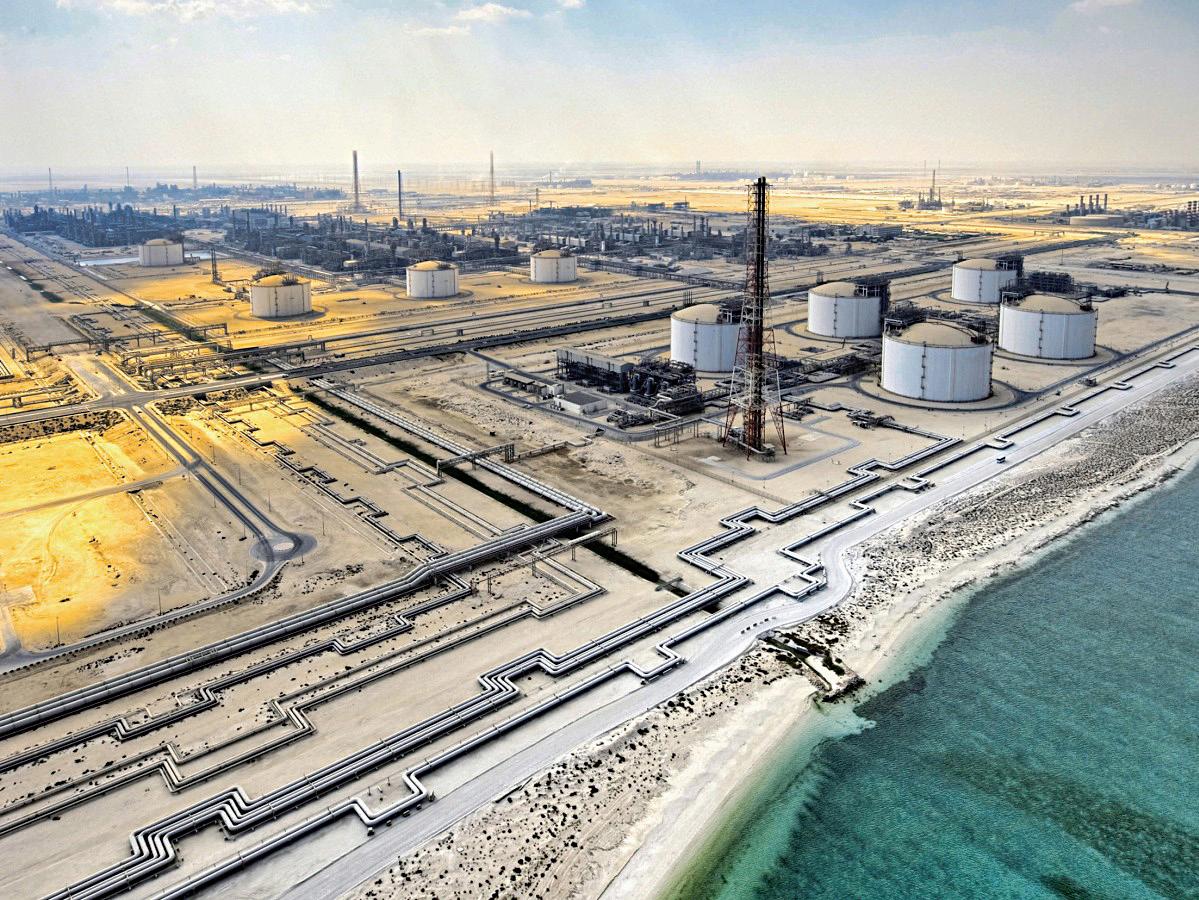
North Oil Company (NOC) A joint venture to operate and further develop the Al Shaheen oil field for the next 25 years, owned by QatarEnergy (70%) and Total (30%). Al Shaheen oil field is in Qatari waters 80 km north of Ras Laffan with 33 platforms and more than 300 wells, producing around 300,000 barrels of oil per day from Qatar’s largest offshore oil field and one of the largest offshore oil fields in the world. noc.qa
Qatargas
The largest LNG producer in the world, operating 14 LNG trains with a total annual production capacity of 77 MTPA. Established in 1984, the first production was in 1996. Qatargas now delivers cargos to 31 countries to meet the world’s demand for safe, reliable and clean energy. Additionally, Qatargas is a leading exporter of natural gas, helium, condensate and associated products. Qatargas also operates the Jetty Boil-Off Gas facility, Al Khaleej Gas, Barzan Gas, Ras Laffan Helium, the two Laffan Refineries (among the largest condensate refineries in the world), and the Ras Laffan Terminal. qatargas.com
Qatar Fertiliser Company (QAFCO) Incepted in 1969 as a joint venture company to produce chemical fertilisers, the first significant step in Qatar’s industrial diversification programme to utilise its abundant natural gas resources. QAFCO is now owned by Industries Qatar (IQ) (75%) and Yara Nederland BV (25%). The majority of IQ shares are owned by QatarEnergy, making QatarEnergy the ultimate parent of the company.
QAFCO inaugurated its first plant in 1973 – today there are six ammonia and six urea completely integrated trains, a melamine plant and two urea formaldehyde plants. QAFCO is the world’s largest single-site producer of ammonia and urea, with an annual production capacity of 3.8 mn metric tonnes (MT) of ammonia and 5.6 mn MT of urea, exported via Muntajat Co. QAFCO also has two
© MARHABA WINTER 2022/23 marhaba.qa PRINT and ONLINE The
Hydrocarbon Industry
Ras Laffan Industrial City
The Hydrocarbon Industry
urea formaldehyde plants producing 60,000 MTPA of UFC85, the anti caking agent vital to urea production.
Meanwhile, the Qatar Melamine Plant is the largest in the Middle East and one of the largest in the world, with a production capacity of 60,000 MTPA. qafco.com
Qatar Petrochemical Company (QAPCO)
Established in 1974 and a joint venture between IQ (80%) and TotalEnergies (20%). QAPCO is one of the largest manufacturers of low-density polyethylene (LDPE) in the region. Joint ventures include Qatar Vinyl Co, Qatofin Co Ltd, and Qatar Plastic Products Co.
QAPCO main facilities consist of an ethylene plant (cracker) with a production capacity of up to 830,000 MTPA, three LDPE plants with a total combined production capacity of over 795,000 MTPA, and a sulfur plant with a production capacity of up to 70,000 MTPA. As by-products, the ethylene plant produces liquid petroleum gases (LPG) with an annual capacity of up to 55,000 MTA and hydrogenated pyrolysis gasoline with a capacity of up to 45,000 MTA. qapco.com
Qatar Plastic & Wooden Products Co (QPPC)
Established in 1998 with commercial production commencing in 2000. The company is owned by shareholders QAPCO and Qatar Industrial Manufacturing Co.
Around 90% of production is sold domestically with the remainder marketed in other Gulf countries and Europe. The production facility is located at Mesaieed Industrial City, producing plastic film for industrial packaging. The company produces form, fill and seal film, shrinkable film and hood, construction foil, greenhouse and agricultural film, general purpose film, heavy duty trash bags, and wood-plastic composite.
Qatar Wooden Products Co commenced commercial production in 2013, a fully automatic wooden pallet production line and heat treatment facility able to produce 1.6 mn wooden pallets a year for QAPCO and other petrochemical companies. qppc.net
Qatar Fuel Additives Company Limited (QAFAC)
A Qatari joint stock company operating facilities at MIC for the production of methanol and methyl tertiary butyl ether (MTBE). Since the 1960s methanol has been produced from petroleum, naphtha and natural gas, and is a clean energy source and raw material for many everyday items.
The QAFAC methanol plant can produce 2,950 metric tons a day of US Federal Grade AA methanol from the natural gas provided by QatarEnergy. The
majority is exported to the Far East, Europe, India and the GCC region.
The QAFAC MTBE plant produces around 1,830 metric tons a day by processing methanol from the on-site methanol plant and field butane from QatarEnergy. It is then used by the QatarEnergy Refinery at Mesaieed to replace lead in Qatar's gasoline. The main international markets are the Far East, Europe, South America and the GCC. qafac.com.qa
Qatar Chemical Company Ltd (Q-Chem) Owned by Mesaieed Petrochemical Holding Company QSC (MPHC) (49%), Chevron Phillips Chemical International Qatar Holdings LLC (49%), and QatarEnergy (2%). MPHC is majority owned by QatarEnergy. The Q-Chem facility produces high- and medium-density polyethylene (HDPE and MDPE), 1-hexene and other products, using technology provided by Chevron Phillips Chemical.
The Q-Chem complex in MIC has a production capacity of 453,000 MTA of polyethylene and a production capacity 47,000 MTA of 1-hexene. The adjacent Q-Chem II facility produces 350,000 MTA of HDPE. Ras Laffan Olefins Company Ltd, owned by Q-Chem II, Qatofin and QatarEnergy, produces 1.3 MTPA of ethylene cracker and is operated by Q-Chem II. qchem.com.qa
Ras Laffan Power Company Limited QPSC (RLPC)
Established in 2001 and the provider of electricity and water in Qatar. RLPC is a joint venture company owned by Qatar Electricity & Water Co (80%), QatarEnergy (10%) and Gulf Investment Corporation of Kuwait (10%). RLPC has a 25-year Power and Water Purchase Agreement with Kahramaa and a 25-year Fuel and Seawater Supply Agreement with QatarEnergy. The RLPC plant at RIC contributes 18% of the country’s power supply and 23% of the country’s water supply and is operated by Ras Laffan Operating Co WLL. rlpc.net
Qatar Fuel Company (WOQOD) QPSC Distributes fuel products within Qatar – diesel and gasoline, marine fuel and aviation fuel – with fuel distribution depots in Mesaimeer and Ras Laffan. WOQOD has a fleet of road tankers, an extensive network of petrol stations, and vessels for supplying marine fuel. Qatar was the first GCC country to convert to fully unleaded gasoline and WOQOD’s diesel has the lowest sulfur content in the region. WOQOD also fulfils Qatar's energy needs with ecofriendly fuel products like LPG and compressed natural gas, and has also diversified into retail marketing with Sidra convenience stores at their fuel stations. woqod.com.qa
QATAR SPORTS E-GUIDE © MARHABA marhaba.qa PRINT and ONLINE
International Companies
ConocoPhillips
The world’s largest independent exploration and production company based on proved reserves and production of liquids and natural gas with operations and activities in 20 countries. In Qatar, the ConocoPhillips Global Water Sustainability Center at Qatar Science and Technology Park (QSTP) focuses on innovative solutions to treat produced water from the oil and gas industry as well as desalination, recycling, awareness and conservation. CSR in Qatar includes the Kulluna Health and Safety campaign, in partnership with Hamad Medical Corporation. conocophillips.com
ExxonMobil
One of the largest publicly traded international energy refiners and chemical companies. In Qatar, ExxonMobil has partnered with QatarEnergy to develop the North Field, participating in 12 of the current 14 LNG trains, 27 of the world’s largest LNG ships, and Qatar’s largest condensate refinery. ExxonMobil is the only foreign participant in Al Khaleej Gas and Barzan Gas domestic gas projects. ExxonMobil also has partnered with QatarEnergy in two LNG receiving terminals in Europe, an export terminal in the US, and in energy projects around the world. The company provides technical and management expertise to QatarEnergy through technical services and secondments of ExxonMobil employees, while at ExxonMobil Research Qatar at QSTP research is conducted in areas of mutual interest. exxonmobil.com.qa
ORYX GTL Ltd
Established in 2003 to develop, construct, and operate Qatar’s first GTL plant, converting natural gas into high quality GTL products including diesel, naphtha, and LPG. ORYX GTL is a 51:49 joint venture between QatarEnergy and Sasol Middle East and India, manufacturing more than 32,400 bpd of high specification GTL diesel, naphtha and LPG. The naphtha is exported from Ras Laffan and marketed by Qatar International Petroleum Marketing Co (Tasweeq) to customers in the Middle East and Far East. oryxgtl.com.qa
Sasol
An international integrated chemicals and energy company that develops and commercialises technologies, and builds and operates world-scale facilities to produce a range of high-value product streams, including liquid fuels, chemicals and low-carbon electricity. In Qatar, Sasol is a 49% shareholder with QatarEnergy in ORYX GTL, which uses Sasol proprietary GTL technology to convert natural gas into liquid fuel and chemical products. sasol.com

Shell
The largest international investor in Qatar. QatarEnergy and Shell have jointly delivered two of the largest energy projects in the world in RLIC. Pearl Gas-to-Liquids (GTL) is the world’s largest GTL plant, costing USD19 bn, and the largest single investment in the Shell Group’s global portfolio. The Qatargas 4 LNG project (QatarEnergy 70%, Shell 30%) combines Shell’s global leadership in LNG with Qatar’s position as the world’s largest LNG supplier. The Qatar Shell Research & Technology Centre at QSTP is a world-class research and development facility and learning centre, with USD100 mn invested on programmes in support of energy and the environment. shell.qa
TotalEnergies
A broad energy company that produces and markets oil and biofuels, natural gas and green gases, renewables, and electricity. Active in more than 130 countries, TotalEnergies puts sustainable development in all its dimensions at the heart of its projects and operations to contribute to the wellbeing of people. In Qatar, TotalEnergies has been present since 1936, and is active in all areas of Qatar’s oil and gas sector – from exploration and production to refining, petrochemicals, marketing of lubricants, and solar energy. totalenergies.qa
marhaba.qa PRINT and ONLINE The Hydrocarbon Industry Checked & Updated October 2022
© MARHABA WINTER 2022/23
QatarEnergy has signed a Memorandum of Understanding (MoU) with General Electric (GE) to collaborate on developing a carbon capture roadmap for the energy sector in Qatar. The MoU will explore the feasibility of developing a world-scale carbon hub at Ras Laffan Industrial City, which is home to more than 80 GE gas turbines.
m
The Gas Industry Explained
By Sarah Palmer
Qatar is one of the world's largest producers and exporters of natural gas – we explain the different types of gas the country produces.
Qatar is one of the world's major producers of natural gas, a worldwide liquefied natural gas (LNG) giant, with the State sitting on huge reserves. Domestic companies such as Qatar Petroleum (QP) are all involved in the natural gas industry, alongside a number of foreign investors (see Company Activities in this section).

According to BP's Statistical Review of World Energy 2020 report, Qatar has the third largest natural gas reserves, behind Russia and Iran, with 24.7 tn cubic meters (tcm). The report states that global proved gas reserves are sufficient to meet 50.9 years of global production at 2019 levels.
QP started the development drilling campaign for the offshore North Field East (NFE) project in April, previously known as the North Field Expansion Project. This phase of the NFE project will increase the Qatar’s LNG production capacity from 77 million tons per annum (Mtpa) to 110 Mtpa; the second phase, the North Field South Project (NFS), will increase production to 126 Mtpa.
Some residents and visitors to Qatar may find the unique vocabulary used in the oil, gas and petrochemical industry – or, as it is more commonly known, 'OGP' – hard to grasp. Here are some easy to digest facts about the main areas of the gas sector:
GTL: Gas‑to‑liquids
When natural gas is extracted from offshore reservoirs and brought up to the production station (platform), it is subjected to a process that separates the oil particles (condensates -- light hydrocarbons including butane and propane) and water, which form a small percentage of the gas stream. The balance – pure, natural gas – is then fed via subsea pipelines to Ras Laffan Industral City (RLC).
This natural gas can then be processed into liquefied natural gas (LNG), as it is easy to transport, or routed to an alternative processing plant to be converted into other materials: diesel, lubricants, waxes and naphtha (a flammable oil containing various hydrocarbons). These are used to manufacture such things as talcum powder and liquid detergent.
Qatar's ORYX GTL project in Ras Laffan employs the Fischer-Tropsch technology, which uses reactors and special catalysts in the conversion of synthesis gas into high-quality products via a three–stage process:
• Reforming of natural gas: methane reactors with oxygen over a catalyst to form a synthesis gas (syngas), a mixture of carbon monoxide and hydrogen.
• Conversion of syngas using the FischerTropsch technology: the most important step of the process, where a broad range of hydrocarbon streams are generated. Gas goes through special reactors and generates liquid hydrocarbons (condensate and syncrude).
• Product upgrade: using isocracking technology, the syncrude is converted into diesel, naphtha and liquefied petroleum gas (LPG).
LNG: Liquefied Natural Gas Production companies search for evidence of oil and gas reservoirs, often found deep inside the earth, using sophisticated technology and drill wells in locations where it is likely to be found.
When the gas comes ashore from the gas fields (in Qatar this is the huge North Field), it is cleaned of impurities, such as hydrogen sulphide, carbon dioxide and water. Condensates are removed, then processed and sold separately.
FEATURE
Ras Laffan Industrial City
QATAR BUSINESS AND ECONOMY E-GUIDE © MARHABA
The purified gas then enters a refrigeration unit that reduces its temperature and shrinks its volume by a factor of 600; in other words, 600 cubic feet of natural gas becomes one cubic foot of LNG, enough to generate about 100 kilowatts per hour of electricity. An average load of 4.7 mn cubic feet of LNG is usually carried by each tanker – enough to generate 482 mn kw/h of electricity or to power approximately 34,000 homes for a year.
Facilities used to convert natural gas to liquid are called trains – this is because of the sequential arrangement of the equipment required to process the gas.
Huge tanks store the LNG until it is loaded through a pipeline into tanks aboard LNG ships. Tanks and pipes are completely and efficiently insulated to keep the liquefied gas cold.
LNG must be maintained at below –82°C to remain a liquid. However, the insulated tanks and pipes are not enough to keep the temperature of LNG sufficiently low. Autorefrigeration is therefore used to help keep the liquefied gas at a constant temperature by maintaining it at its boiling point. LNG is stored as a boiling cryogen, a substance used to produce very low temperatures, with a boiling point at around –84°C. Stored LNG is similar to boiling water, albeit much colder! The temperature of boiling water (100°C) does not change, even with increased heat, as it is cooled by evaporation (steam generation). In much the same way, LNG will stay at near constant temperature if kept at constant pressure. As long as the steam (LNG vapour boil off) is allowed to leave the tank, the temperature remains constant. When an LNG ship reaches the customer’s port, the liquefied gas is offloaded into insulated storage tanks and then processed through a regasification terminal that puts heat back into, and vaporises, the liquid. The gas is then transported as conventional pipeline gas.
LPG: Liquefied Petroleum Gas
LPG is refined from oil and natural gas the same way petrol is refined from crude oil. While LPGs may not be the primary activity of most energy companies, they are produced nonetheless because they are a byproduct of the refining process for other fuels.
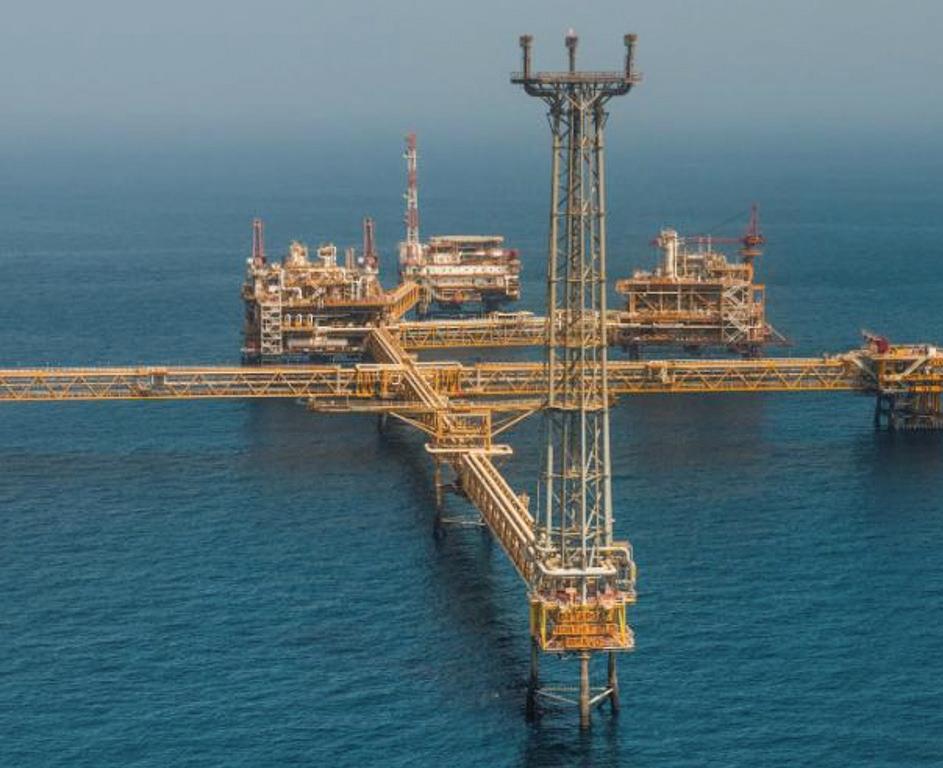
When natural gas is drawn from the ground, about 90% of it is methane. The rest is in the form of various LPGs, which is separated from the methane before the methane is fed into pipelines for use in our homes. The amount of LPG that comes from natural gas varies, but it is usually from 1 to 3%, and mainly comprises propane or butane. It can be used to run vehicles such as lorries and buses, and for domestic cooking and heating. It is one of the most common alternative fuels used in the world today.
Propane and butane can be stored in liquid form with only moderate pressurisation; isobutane, which has the same simple chemical formula as butane but a different chemical structure, is also used. Usually, butane and isobutane are mixed with propane in various proportions, depending on the intended use of the fuel.
Propane is useful as a portable fuel (for example, when camping) because its boiling point is –42°C, meaning that even at very low temperatures, it will vaporise as soon as it is released from its pressurised container. This results in a clean‑burning fuel that doesn't require much equipment to vaporise it and mix it with air. Butane's boiling point is approximately 0.5°C, so will not vaporise in very cold temperatures. It therefore has more limited uses and is mixed with propane instead of being used by itself.
CNG: Compressed Natural Gas CNG is a fossil fuel substitute for petrol, diesel or LPG. It is more environmentally friendly as it causes less pollution, and gas‑fuelled vehicles are silent, perfect for densely populated urban areas. The Environmental Protection Agency in the US believes vehicles using CNG reduce carbon monoxide emissions by 90–97%, and CO2 emissions by 25%.
CNG is often confused with LNG and LPG: CNG is stored as a gas at high pressure; LNG is stored as an uncompressed liquid, while LPG is compressed. CNG is lighter than air, so will not form a puddle like petrol or diesel. Any leaks will simply evaporate. Nor does CNG not have any noticeable smell; a distinctively noxious odorant (think of rotten eggs) is deliberately added as an alert to a leakage. m
© MARHABA WINTER 2022/23
Qatar's North Field
Infrastructure in Qatar
gas and petrochemicals industries. However the government is diversifying economic development elsewhere, especially in view of fluctuating oil prices.
Spending on infrastructural projects is again a primary focus in the State Budget for 2022, not only for the FIFA World Cup Qatar 2022TM, but also for the education and healthcare sectors – see Economy in this section for details.
Conferences and Exhibitions
Infrastructure in Qatar

Qatar National Vision
As arguably the world’s fastest-growing economy, Qatar recognises the importance of diversification and sustainability. It also acknowledges the inherent challenges of a rapidly-increasing population, further industrialisation, and the resultant need for an ever-expanding infrastructure.
To manage these challenges in effectively, Qatar National Vision (QNV) 2030 was first published in 2008. Based on the guiding principles of the Permanent Constitution, it defines the nation’s medium-to-long-term objectives and creates a framework for sustainable national strategies. QNV 2030 rests on four pillars – Human, Social, Economic and Environmental Development – each with clearly defined individual long-term outcomes yet important inter-relationships.
Under QNV 2030, all new projects should provide a high standard of living for future generations, with investments in education, research, healthcare, transport and industry, to enable Qatar to sustain its own development by 2030. Plans include an integrated transport system, a major overhaul of roads and highways, drainage and sewage, and the renovation of downtown Doha.
The first wave of specific actions and targets were defined in the Qatar National Development Strategy (NDS) 2011–2016. NDS 2018–2022 has seen many of its goals achieved, despite exposure to abnormal conditions like fluctuating oil prices and the economic repercussions of the COVID-19 pandemic. The Planning and Statistics Authority (PSA) has begun preparing for NDS 2023–2030.
Economic Strategy
Qatar’s economic development aims to create and sustain a competitive and diversified economy capable of meeting the needs of, and securing a high standard of living for, its population now and in the future. The economy has historically been significantly boosted by growth in the oil,
An influential player in the region’s MICE market, the first major facility opened in 2011. The Qatar National Convention Centre, a member of Qatar Foundation (QF) and located in Education City, is one of the largest, most technologically advanced venues in the Middle East, employing environmental and sustainability best practices including LEED gold certification. Designed by Arata Isozaki, the award-winning venue features a 3D representation of the Sidra tree, symbol of QF. The 200,000 sq m venue has a 40,000 sq m exhibition space, a conference hall for 3,800 delegates and a 2,300-seat theatre.
The 47,700 sq m Doha Exhibition and Convention Center opened its doors in 2015. The building includes a state-of-the-art exhibition hall, modular wall system, and high-tech meeting and conference rooms. Located in Al Dafna, the venue has five exhibition halls, which can be used as one 29,000 sq m hall thanks to a unique wall partition system. The 18-metre high ceiling is the highest in the Middle East, supported by a revolutionary cantilever roof and is pillar-free.
Annual business conferences and exhibitions include Project Qatar, QITCOM, Cityscape Qatar, Arab Future Cities Summit, Green Building Expo, World Stadium Congress, and trade summits.
Spectacular Buildings
Dramatic changes to Doha’s skyline have seen glass and concrete towers built with materials imported from all over the world.
The population has increased from nearly 1.7 mn people in 2010 to over 2.8 mn in August 2022, mainly living in and around Doha. Just 50 years ago the 20,000 population of Doha lived and worked in single or two-storey structures on the narrow streets of what was just a small town on the southern shore of Doha Bay.
In the 1970s, as the country changed from fishing and pearl diving to oil production and export, the decision was taken to reshape Doha Bay, extend the waterfront and expand the town area by
QATAR BUSINESS AND ECONOMY E-GUIDE © MARHABA
Central Doha and Corniche Beautification Project
reclaiming land. The area now known as Al Dafna (or ‘West Bay’) was dredged from the sea and the first building was the iconic Sheraton hotel, now dwarfed by the neighbouring buildings.
Demand for town centre real estate has grown, with more luxurious living and working environments, forcing the city upwards. The traditional inwardlooking, small-windowed, courtyard dwellings –cooled naturally or via a wind tower and vented walls – reflect the limitations of building materials and technology at the time. Now developments in glass technology and energy-efficient, eco-friendly air conditioning allows Qatar to build green.
Developments to Infrastructure
The public-private partnership (PPP) law, approved by the Cabinet in 2019, will support projects connected to Qatar National Vision 2030 and the FIFA World Cup Qatar 2022TM. The PPPs will be used for a variety of sectors, including healthcare, education, sports, real estate and infrastructure.
The State Budget for 2022 is based on an average oil price of USD55 a barrel. Expenditure increased by 4.9% to QAR204.3 bn, with QAR74.0 bn allocated for major projects reflecting a temporary increase for the FIFA World Cup Qatar 2022TM.
The State will also continue work on development projects related to infrastructure, citizens’ land development and public services. Read more about the 2022 State Budget in Economy, in this section. Public Works Authority ashghal.gov.qa
The Public Works Authority (Ashghal) was established in 2004 for the planning, design, procurement, construction, delivery, and asset management of all infrastructure projects and public buildings in Qatar. Key projects include the Expressway Programme, roads and drainage under the Local Areas Infrastructure Programme, and the Inner Doha Re-sewerage Implementation Strategy.
Ashghal launched its Corporate Strategy 2018–2022 under the authority's new vision ‘Excellence in delivering and managing efficient sustainable infrastructure’, with 10 objectives to accomplish its mission of ‘continuously enhancing customer satisfaction through leading project and asset management services and solutions’.
Ashghal's Supervisory Committee of Beautification of Roads and Public Places develops major roads, pedestrian and cycle paths, and landscaping, including parks. Underway is the Doha Central and Al Corniche Development and Beautification Project, which will transform the area into a pedestrian and cyclist eco-friendly zone. There will be plazas and green public spaces, as well as the restoration of historical areas.
Numerous expressway projects have brought great benefits to navigating around the country. On Al Majd Road, Road 2 links Mesaieed Industrial City with Lusail City, while Road 4 links Mall of Qatar with Ras Laffan.
Construction has been completed on the sewage network in the inner Doha areas, enhancing efficiency and preventing pollution. Sewage infrastructure requirements continue around the country, including the Mesaimeer Pumping Station and Outfall featuring one of the longest outfall tunnels in the world at over 10 km. In September 2022, a PPP worth QAR5.4 bn was signed between Ashghal and a consortium of foreign companies for Al Wakra and Al Wukair Sewage Treatment Works, with the plant's first phase serving 306,000 people in southern Qatar.
In December 2021, Ashghal handed over 50 new parking lots to the Supreme Committee for Delivery and Legacy in time for the 2021 FIFA Arab Cup™ –they will also be used for the FIFA World Cup Qatar 2022TM. Also in time for fans is the new West Bay North Beach, an entertainment centre with fan zones, sports and play areas, and other amenities.
Qatar General Electricity & Water Corporation km.com.qa
The corporation, known as Kahramaa, was established in 2000 under the Ministry of Energy and Industry to regulate and maintain the supply of electricity and water to its customers. Kahramaa transferred ownership of its stations to Qatar Electricity and Water Company in 2002. In 2018 the Minister of State for Energy Affairs, HE Saad Sherida Al Kaabi, assumed responsibility for Kahramaa as part of his remit to oversee the regular and sustainable supply of energy, power and water for domestic purposes.
An ambitious strategic plan sees Kahramaa investing QAR38 bn to meet increasing demands to the electricity and water supply, with a further QAR6 bn after 2022. This includes five mega water reservoirs to be online by 2026 providing storage for 2,300 mn gallons of water, while the power generation phase will produce 2,520 megawatts of electricity. The plant will add around 30% water and 25% electricity of local demand once fully completed.
Installed under the Smart Metering Infrastructure Project, 600,000 advanced digital meters will allow customers to monitor their consumption. This is in line with the corporation's National Program for Conservation and Energy Efficiency (Tarsheed), which celebrated its 10th anniversary in 2022 and has saved QAR4 bn during its second phase. The third phase will run from 2022 until 2030.
© MARHABA WINTER 2022/23
marhaba.qa PRINT and ONLINE
Infrastructuree in Qatar
Infrastructure in Qatar
marhaba.qa
In 2020, Kahramaa awarded a QAR1.7 bn contract to develop the country’s first utility-scale solar PV project to Japan’s Marubeni and France’s Total. The 800MW solar PV independent power producer scheme will be on a 10 sq km plot in Al Kharsaah, west of Doha. Siraj-1 Company is the project company developer, owned by Siraj Energy (60%) and Marubeni and Total (40%). Power China Guizhou Engineering is the engineering, procurement and construction contractor.
Selected Megaprojects in Qatar
Qatar is undertaking a number of megaprojects to satisfy QNV 2030 and the football event, good news for both local and international businesses. These include projects with Qatar Rail, Qatar Free Zones Authority, the North Field Expansion under QatarEnergy, and the expansion of Hamad International Airport. Here are just a few:
FIFA World Cup Qatar 2022TM qatar2022.qa Previously known as the Qatar 2022 Supreme Committee, the Supreme Committee for Delivery and Legacy (SC) has signed stakeholder agreements with Qatar Rail, Ashghal, Kahramaa, Aspire Zone Federation and Qatari Diar, for projects to deliver the infrastructure for the event
The new stadiums, designed by the world's leading architects, reflect aspects of Qatari culture, and take into consideration three priorities: access and comfort, sustainability, and post-tournament legacy. Fans are able see more than one match a day, as the longest distance between venues is just 55 km. Stadiums include:
• Khalifa International Stadium, originally built in 1976 and reopened in May 2017 following its renovation.
• Al Janoub Stadium, designed by the late Zaha Hadid and inspired by traditional dhow boats. The stadium opened on 16 May 2019.
• Al Bayt Stadium, its design based on a Bedouin tent and with a retractable roof. The official opening of AI Bayt Park took place on 11 February 2020, National Sport Day.
• Education City Stadium, officially completed on 15 June 2020.
• Ahmad bin Ali Stadium, with an undulating façade and sand dune-shaped structures. The stadium opened 18 December 2020.
• Al Thumama Stadium, designed by Qatari architect Ibrahim M Jaidah, representing the traditional gahfiya. The stadium was inaugurated on 22 October 2021.
• Stadium 974 (previously Ras Abu Aboud Stadium),
built from shipping containers and modular steel, and the first fully reusable FIFA stadium. The stadium was inaugurated on 20 November 2021.
• Lusail Stadium (below), host of the opening and closing ceremonies and the final match on Qatar National Day, 18 December. Its design is inspired by the fanar lantern and the motifs on bowls and other vessels seen throughout history in the Arab world. The stadium was inaugurated on 11 August 2022.
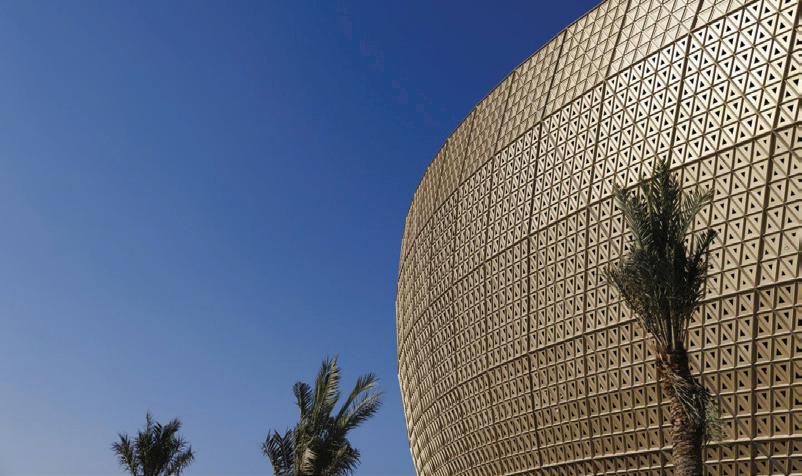
Sustainability is an integral part of the project. The FIFA World Cup Qatar 2022™ Sustainability Progress Report is available online, in a format which enables FIFA, SC and the FIFA World Cup Qatar 2022 LLC (Q22) to continuously update stakeholders on progress and performance regarding tournament sustainability efforts.
See our special section on the FIFA World Cup Qatar 2022TM at the front of this issue.
Qatar Integrated Rail Project corp.qr.com.qa Following its establishment in 2011, Qatar Railways Company (Qatar Rail) is leading one of the largest rail projects in the world to meet the demands of Qatar’s dynamic and growing population. The company is responsible for the design, construction, commissioning, operation and maintenance of the entire network and systems.
The state-of-the-art railway network currently consists of Doha Metro, a rapid transit system connecting communities within Doha and its suburbs, and Lusail Tram, a service for convenient travel within the new city of Lusail.
The Doha Metro: Three lines covering the Greater Doha area with connections to commercial and residential areas throughout the city. In central Doha, the Metro network is mainly underground, while at the outskirts it Is at ground level or elevated. The project has been conducted over multiple phases, phase one includes three lines (Red, Gold, and Green) which are now open to the public.
• The Red Line is about 40 km running from Al Wakra in the south to Lusail in the north, with a connection to Hamad International Airport.
QATAR BUSINESS AND ECONOMY E-GUIDE © MARHABA
PRINT and ONLINE
There are 18 stations, and passengers can transfer to the Lusail Tram at Legtaifiya and Lusail stations.
• The Green Line runs east from Al Riffa to Al Mansoura, in the west.
• The Gold Line runs from Ras Bu Abboud to Al Aziziya with 11 stations.
Lusail Tram: An integrated transportation system serving Lusail City, a state of the art tram based system connecting major points of interest in the city. The tram is designed to travel on streets, sharing road space with other traffic and pedestrians. The project has four lines and 25 stations, with two interchange stations allowing passengers to access the Doha Metro.
Lusail City lusail.com
One of the largest projects in Qatar costing an estimated QAR163.8 bn, Lusail City is developed by Lusail Real Estate Development Company (LREDC), a subsidiary of the Qatari Diar Real Estate Investment Company, itself a subsidiary of Qatar Investment Authority. Spanning 38 sq km north of Doha, Lusail City is master planned to accommodate more than 450,000 residents and visitors. Launched in 2004, features include:
• Energy City: A centre for government ministries, and public and private company headquarters.
• Fox Hills district: Housing for 40,000 residents, with a hospital, schools and mosques.
• Place Vendôme: Inspired by Paris' Rue de la Paix, with a mall and luxury retail wing, two five star hotels (Le Royal Meridien and Palais Vendôme), a luxury collection hotel (Le Royal Meridien Residences) and entertainment areas.
• Qetaifan Island North: A mixed use project with a beach club and plazas operated by Rixos Qetaifan Island North, Meryal waterpark and the five star Rixos hotel Qetaifan Projects is owned by Katara Hospitality.
Read more about Lusail City in Discovering Qatar
Msheireb Downtown Doha msheireb.com
The flagship project of Msheireb Properties, a subsidiary of Qatar Foundation, Msheireb Downtown Doha (MDD) is the world’s first sustainable downtown regeneration project, the QAR20 bn restoration of a 31 hectare site. Msheireb means ‘a place to drink water’ in Arabic, and is the historical name of downtown Doha.
The 'smart city with soul' is aiming for Gold or Platinum LEED Certification. The recently launched Doha Design District, a new design and innovation hub, will grant free zone status to occupants from a multitude of business sectors.
MDD is divided into five broad quarters, with hospitality, retail, residential and commercial areas. Barahat Msheireb is the region’s largest covered public square, anchored by the Cultural Forum and the Mandarin Oriental Doha hotel. The Heritage quarter features four historic houses that have been restored and turned into museums. The Diwan Amiri quarter comprises the Diwan Annexe, Amiri Guard building and Qatar National Archive, while Sikkat Wadi Msheireb is fully pedestrianised with the Alwadi Hotel Doha MGallery Hotel Collection and the Park Hyatt Hotel.
MDD is the central interchange for the Doha Metro, with other methods of transportation underground for a pedestrian‑friendly atmosphere. The MDD tram is available to transport visitors.
Read more about MDD in Discovering Qatar Hamad International Airport dohahamadairport.com Qatar's world leading Hamad International Airport revealed plans for its second expansion phase in 2019. Phase A comprised the central concourse linking concourses D and E, and the opening of The Oryx Garden Hotel. This phase officially opened in October 2022, allowing annual passenger handling capacity to increase to 58 mn.
Phase B, the final expansion phase, will begin in January 2023 and is expected to be completed within the next two and a half years. This will extend concourses D and E to increase capacity to over 70 mn passengers per annum. Features include an indoor tropical garden, a water feature, landscaped retail and F&B spaces and a new world class lounge. The expansion also includes the construction of a new cargo terminal, which will boost handling capacity to a 3.2 mn tonnes per annum. The terminal is expected to be ready by 2023.
The airport works with the Ministry of Municipality to achieve goals under Qatar National Vision 2030. This includes improving carbon efficiency, reducing greenhouse gas emissions, and modernising the waste management process.

© MARHABA WINTER 2022/23
PRINT and ONLINE
Infrastructuree in Qatar marhaba.qa
Checked & Updated October 202 2 m
IT ALL COMES TOGETHER WITH YOU

Offers a whole new way of living.
With its magnificent waterfronts, Luxurious hotel, unrivalled accommodations, lush greens, and the state-of-the-art waterpark at its heart, the world’s highest tower of its kind.
Invest now in Qatar’s future iconic destination. Together, the picture is complete.
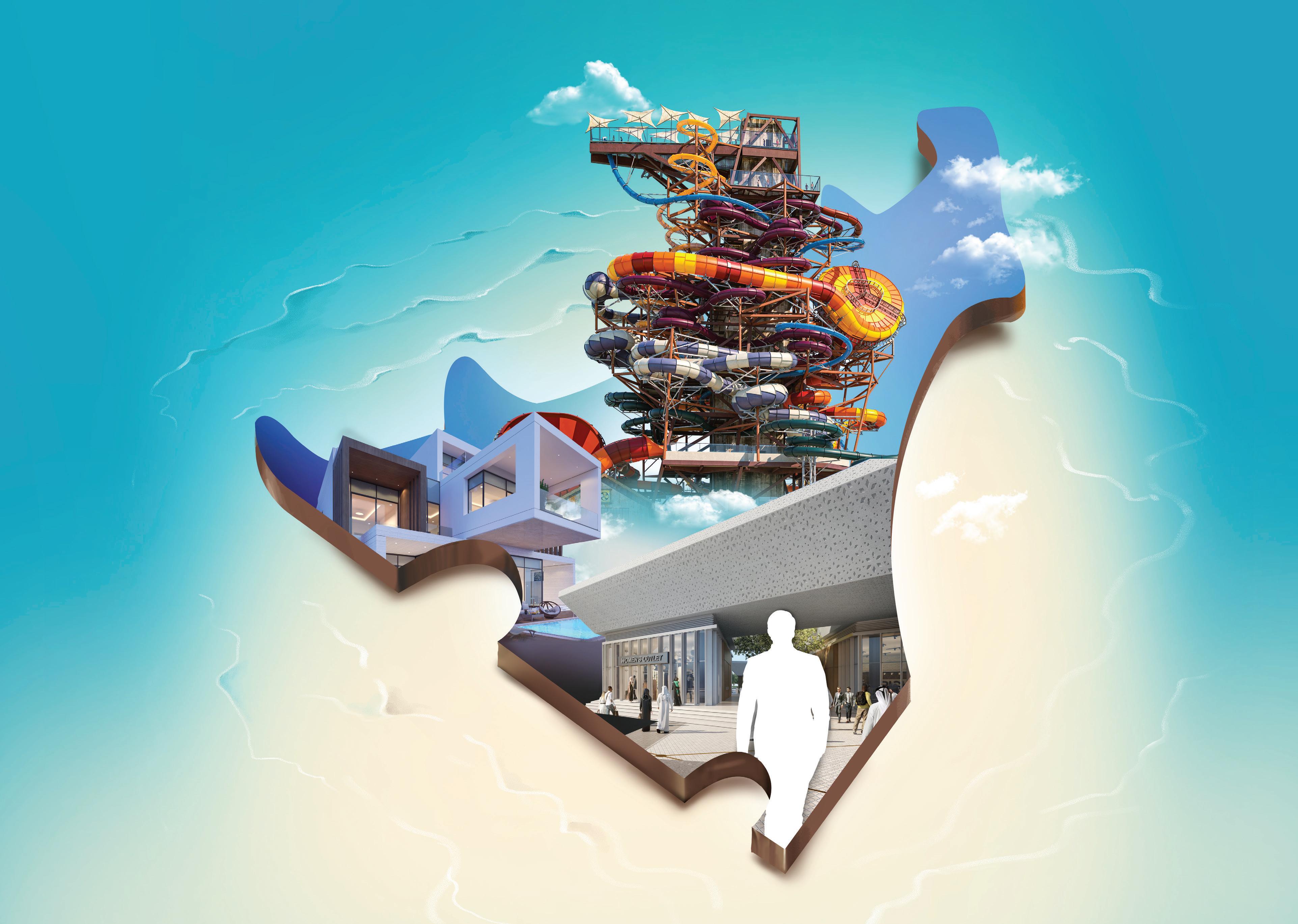
Qetaifan_34(W)x24(H) QATAR BUSINESS AND ECONOMY E-GUIDE © MARHABA

www.qetaifanprojects.com © MARHABA WINTER 2022/23
Qetaifan Island North
Located off Lusail City, and designed to be Qatar’s future iconic destination, Qetaifan Island North (QIN) spans approximately 1.3 mn square metres (sq m), with 207,015 sq m of Meryal waterpark alone.
The island also features exciting entertainment attractions that the whole family can enjoy, in addition to diversified waterfronts, distinct neighbourhoods, a luxurious hotel, pedestrianfriendly streets, living gardens, and world-class facilities that make it a modern, globally competitive community with a unique design that is inspired by the rich culture and nature of the region.
The Island also features unique residential villa plots with exceptional waterfront views, allowing the ultimate comfort and relaxation for its residents.
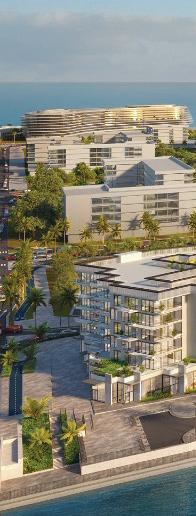
The waterside Retail and Festival Plazas are operated by Rixos Qetaifan Island North, along with the Beach Club, hotel, and Meryal waterpark. Qatar's newest and most vibrant waterside community of stimulating retail experiences, canal-side cafes, and a range of restaurants from quick service to exotic fine dining, is now leasing and will shortly be ready for fit-out and occupation. This will soon become one of the most exciting and animated waterfront locations in the region.
The Retail and Festival Plazas include 92 units located next to the 6,500-capacity Meryal waterpark area. The waterside retail, café, and restaurant outlets are in three adjacent locations, adjoining a 5-star luxury hotel run by Rixos. The total area is 12,300 sq m overlooking the canal, with 1,426 parking spaces.
Qetaifan Projects have also announced a number of investment opportunities in Qetaifan Island North. There is a range of options in the three distinct areas adjoining the world-class waterpark and 5-star luxury hotel.

The sales launch of Qetaifan Island North Phase 3 villa plots began in March 2022, which consists of serviced villa plots with a unique competitive design at regional and global levels, comprising beach access and garden view villa plots. Moreover, for the first time, there will be villa plots with a distinctive view of Qetaifan Island North’s Linear Canal and the sea.
Also announced in March 2022 was a collaboration between Qetaifan Projects and Dar Al Arkan, a real estate company in Saudi Arabia. Les Vagues residences by Elie Saab is a unique, premium project inspired by the beauty of the natural world surrounding QIN.
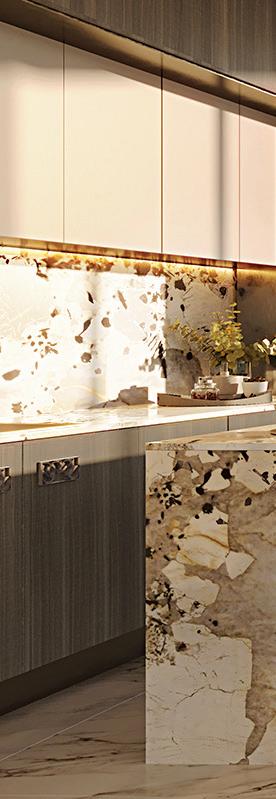
Les Vagues, meaning 'waves' in French, reflects luxury island life with clean and contemporary lines, softened by carefully selected palms and tropical foliage.
The luxurious one-, two- and three-bedroom seafront apartments feature balconies and terraces with floor-to-ceiling windows offering uninterrupted panoramic views of the sea, marina, and Lusail City skyline. Meanwhile, the interiors incorporate globally-celebrated designer Elie Saab's signature style, with luxurious touches and an exceptional level of quality.
FEATURE QATAR BUSINESS AND ECONOMY E-GUIDE © MARHABA
Sales of Les Vagues residences by Elie Saab were launched in October 2022 during an event attended by HE Sheikh Nasser bin Abdulrahman Al Thani (Chairman and Managing Director of Qetaifan Projects), Yousef Al Shelash (Dar Al Arkan Chairman), Ziad El Chaar (Dar Al Arkan Global CEO), and Elie Saab.
Speaking at the event, Elie Saab said 'We are thrilled to be working with Dar Al Arkan Global on a new lifestyle address. Les Vagues is our first project in Qatar, and it has been meticulously designed to complement the luxury island life of Qetaifan Island North. We are confident that this new project will appeal to our discerning clientele from around the world seeking bespoke seafront living spaces with magnificent views.'
Total sales are expected to reach over QAR1 bn and will set new standards of luxury living in Qatar with an architectural design that enhances the appeal of seafront living.
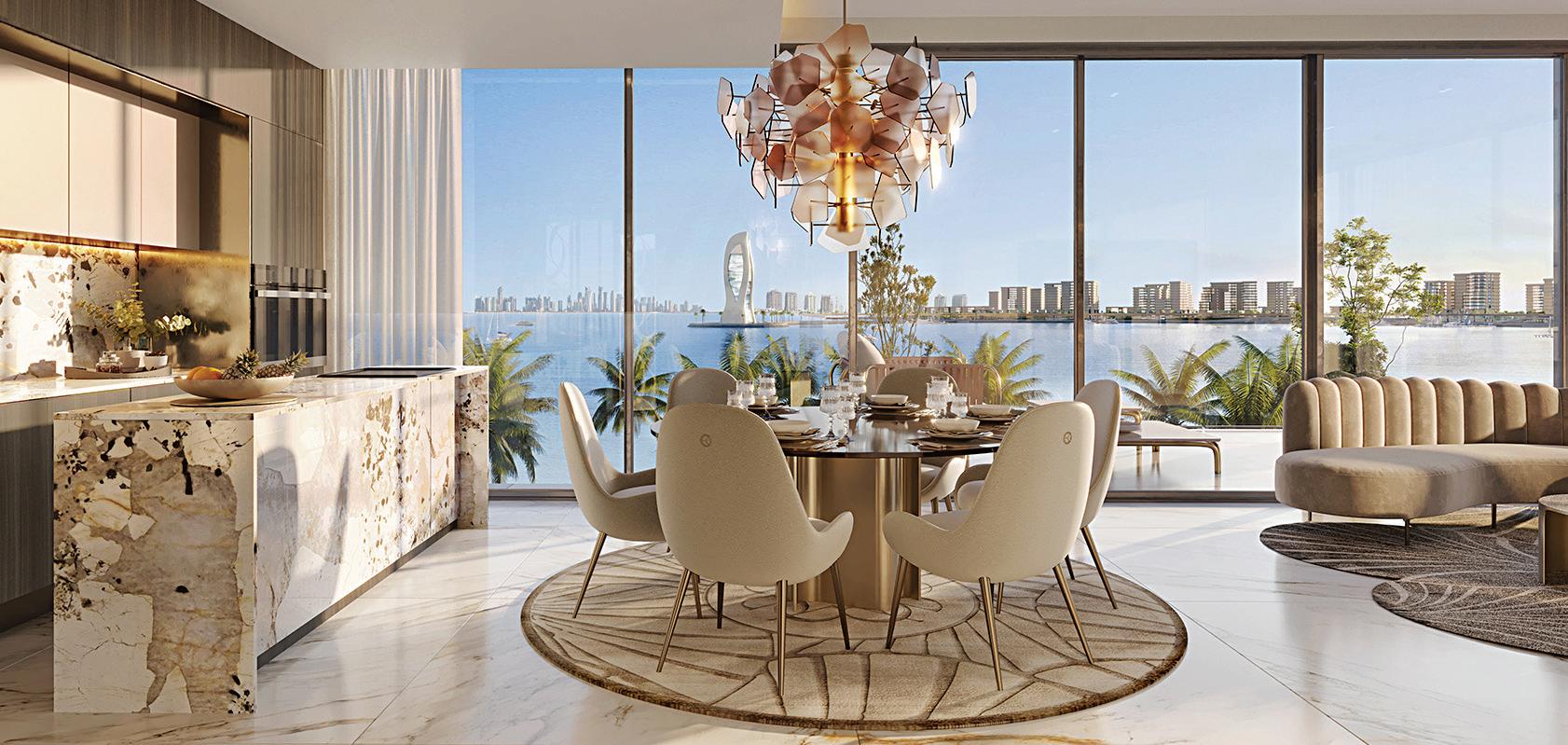
About Qetaifan Island North
The island is the first and main project of Qetaifan Projects, a real estate development company founded in October 2017, fully owned by Katara Hospitality, a leading global hotel owner, developer and operator based in Qatar.
Qetaifan Projects aims to support the country's long-term economic vision by building cities with sustainable and intelligent infrastructure.
Katara Hospitality aims to change the world of hospitality through investment and innovation, leaving a prominent legacy for future generations in line with Qatar National Vision 2030.
Qetaifan Island North is a unique project spanning approximately 1.3 mn sq m with 869,266 sq m of Gross Floor Area. It will feature six beaches, making the island an important part of Lusail City's distinct waterfront.
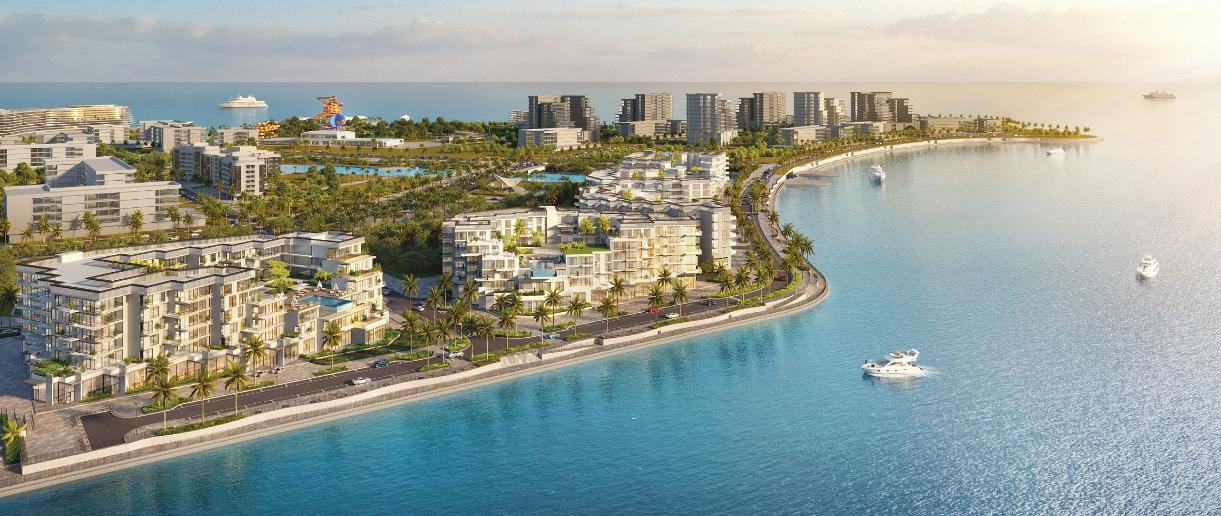
Work is underway continuously at QIN, with more than 7,000 workers, seven contractors and seven different project packages.
QIN promises to be a thriving waterfront hub representing a new, modern lifestyle. One of the main attractions is the state-of-the-art waterpark Meryal, with its 36 rides and the 85.5-metre Icon Tower, the highest water slide in the world and situated on a small island opposite Qetaifan Island North. Linked by an overwater bridge, thrillseekers can access the Icon Tower by a train that passes by the bridge. An artificial canal is linked to the sea, allowing visitors to enjoy fishing, boating, and plenty of other family-friendly fun activities.
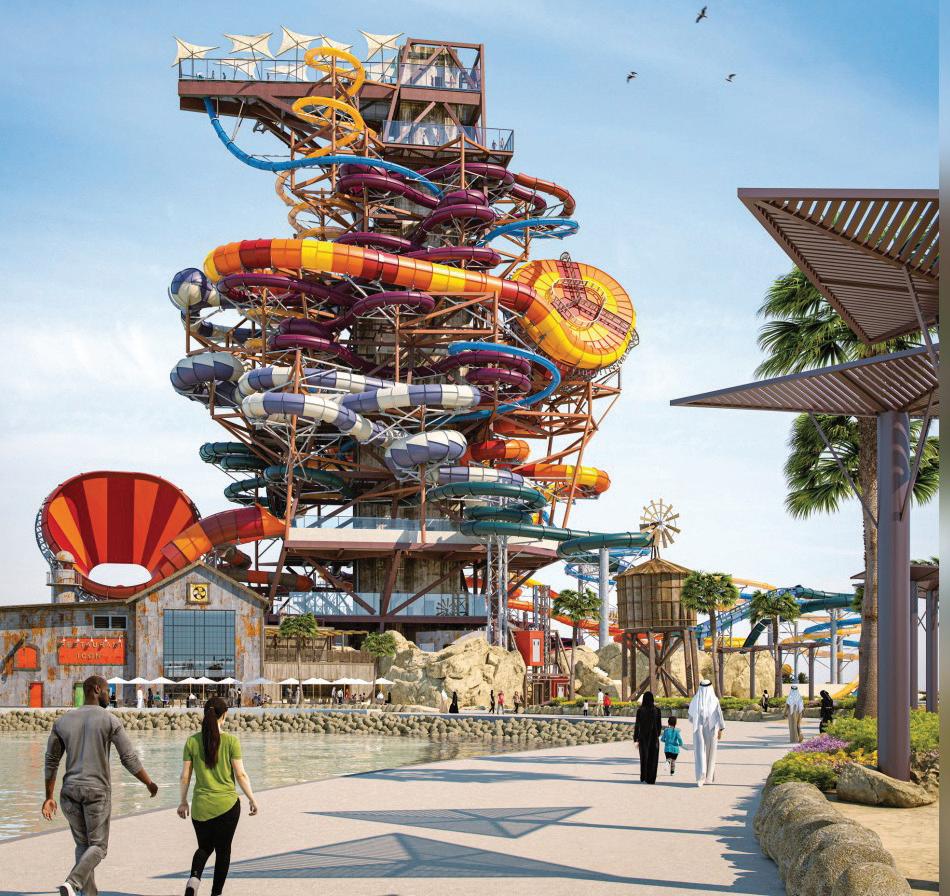
Spread over the canal side are community facilities, such as snack stalls, prayer rooms, seating, as well as game rooms, and kid’s club.
If you prefer to relax in style, Qetaifan Island North will have a Beach Club offering an assemblage of activities to be enjoyed by the whole family.
For more information, visit qetaifanprojects.com
m
Meryal waterpark
Les Vagues residences by Elie Saab
© MARHABA WINTER 2022/23
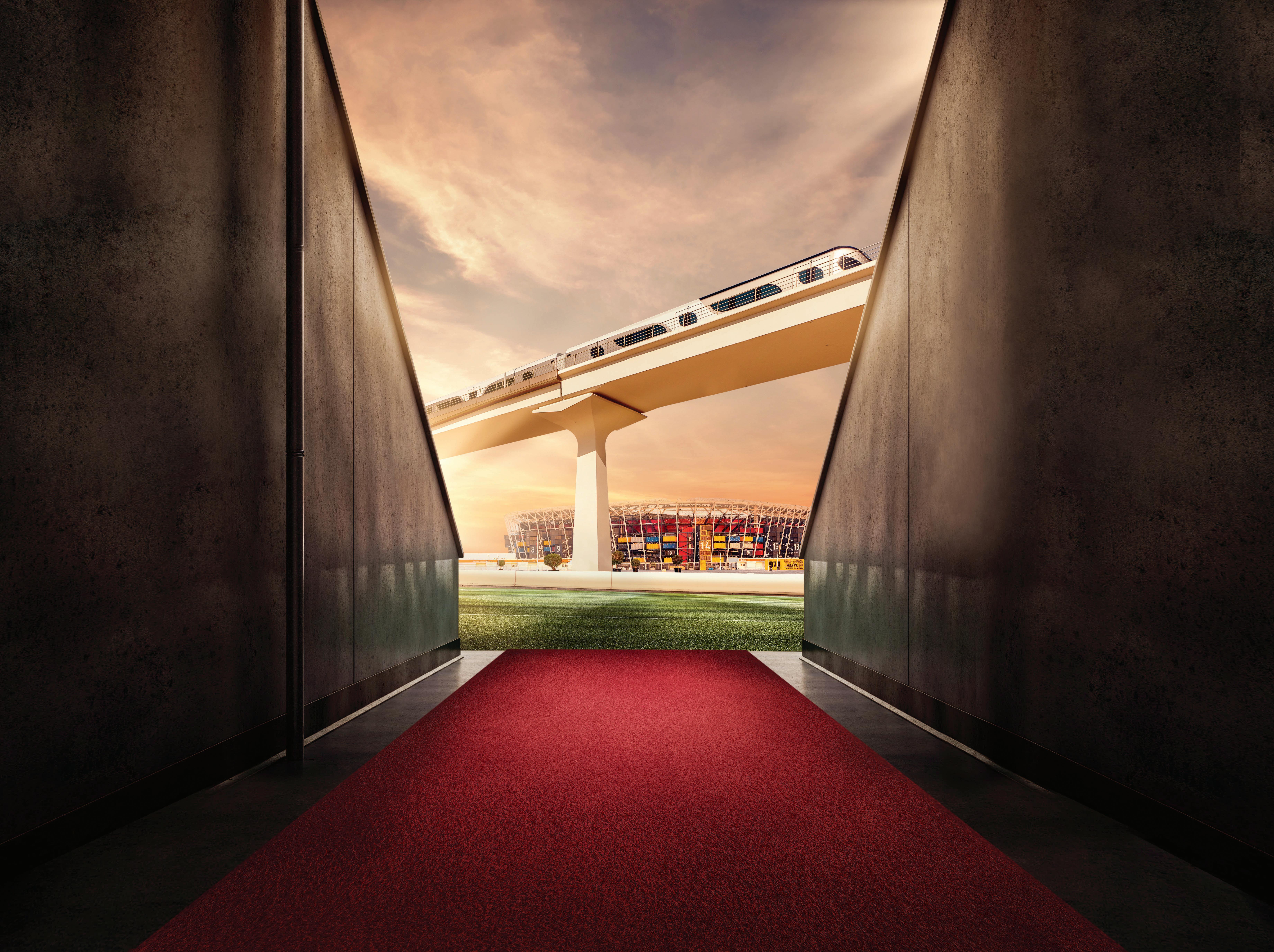
qrc.official qrc_officialqatar-rail-company QatarRailqatarrail_official www.qr.com.qa
Metro
heart of the #ChangingTheWayWeMove QATAR BUSINESS AND ECONOMY E-GUIDE © MARHABA
Doha
taking
taking you to the the action

© MARHABA WINTER 2022/23
#ChangingTheWayWeMove
